-

The life of Saint Maximus the Greek_
Click on the feather to begin the tour
Paintings

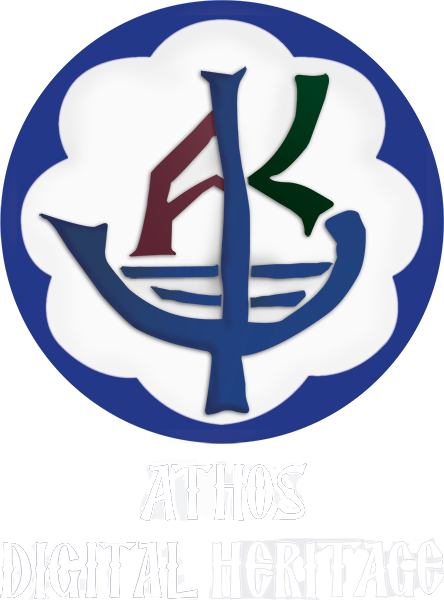
-

The swan's feather
That is why I struggled, that is why I did not keep silent, when I saw it excusing the sins of the strong and taking for cheap rewards of perishable and dishonest riches and a seat at the ruler's table, flattering his megalomania. Soon I will stand before You. And if I have no excuse for my perversions, I will tell you this: I have been the most sinful Lord, but I have never been a heretic. And did not betray your plan for the world. I fought until my very last breath to ensure your Church does not lose its true flavor, even if the world rots away.
Whatever Your lovewant for me, so be it.
So… Thy will be done.
Amen!
_
My name is Maximus. They used to call me Michael. I have lived my whole life dedicated to the will of God,whoI loved more than myself. I wanted to live a life full of meaning, to say that I passed from this land and left my mark behind. Whatever I was involved in, I gave my heart and soul. First, in the wisdom of my Greek ancestors, despite the fact thatI found my Greek roots indifficult times, just 17 years after the fall of Constantinople. After that, immigrated to Italy and immersed myself in the achievements of the West. But I quickly realized that my soul was yearning for the wisdom of another world. That’s how I ended up as the last of the monks at the Monastery of Vatopedion on Mount Athos. _
I believed that it was there was going to finish my days. But a calling, like the one Paul heard from the Macedonian boy in his vision, came from the North, from the Russian order. They were seeking wisdom from the Greek tradition to support a new Orthodox Empire. Europe was changing, people were changing. In the new world, Russia would be the only free Orthodox country. But what kind of Orthodoxy would that be? A genuine Orthodox Patristic society or alienated one? And so, God found me and my elder mentor worthy to confront with our meagre powers the beast of ignorance and the deterioration of the Orthodox faith and the spiritual life of our Russian brothers.
I arrived here bathed in glory, only to end being slandered, tortured and sentenced a life in prison. My crime? Only this: That I fought for a free and living Church.
I accept the price I have to pay. I will never see my beloved Vatopedi again. The Russians earth will soon accept my pain-wracked body. And when I stand before the terrible step before Him, I will invoke only one thing: that my faith is burns to obey His wise will. But I have a hidden hope: that my efforts will not be in vain. Because I did not fight for my own glory, but for the glory of the great God, who I am sure loved this people as well as mine. _
I will not live to see the future. I am here, in the present, with no friends, no books, not even ink. They left me with nothing. Only this, a swan’s feather, with which I write on the walls of my cell using soot and my own blood for ink. Yet even so, His will be done , no matter what. I will pass away, but Orthodoxy, Europe and the world will all continue to need what Christ left us, unadulterated and true.
My beloved Christ, I dreamed of Your Church, unmoved by the purposes and the mechanisms of this world._
Painting
-

Arta
I was born in Arta five and a half centuries ago, in 1470. Back then, it was a great city, a beautiful city. The wind carried the scent of the Epirus mountains, and the city laid like a lady in the arms of Arachthos, with its crystal clear waters flowing around her. Her wealth of great, brought by merchants passing through on their way from West to East and back again. But that trade and wealth never travelled alone. Arta became a crossroads where ideas, knowledge and thought met. And, as the whole Epirus was handed to the Turks by treaty, Arta did not experience disaster._
My family had settled there before the Turks came. My mother was called Irene (Peace). My beloved father, my first teacher, was the lord Manuel Tribolis, a native of Sparta. A noble family, which had even produced a Patriarch as well as many officials who served in the Despotate of Mystras. First image I can remember is my father sitting at his wooden desk writing with his pen, a swan feather, whilst I quiet crawl around him, looking up the shelves with their leather-bound books._
Από την αρχή λοιπόν της ζωής μου, οι ευκαιρίες μου για μόρφωση βαθιά και ζωή ξεχωριστή ήταν πολλές. Σε εποχές μεγάλης αμάθειας για τους συμπατριώτες μου, εγώ είχα στη διάθεσή μου τη σοφία του πατέρα μου, τη βοήθεια ξεχωριστών δασκάλων που σχεδόν καθημερινά βρισκόντουσαν στο σπίτι μου, αλλά και μια μεγάλη, τη μεγαλύτερη βιβλιοθήκη της Ηπείρου, για να μελετώ, από παιδάκι ακόμη, την παλιά και την νέα σοφία. Δεν γεννήθηκα όμως μόνον σε σπίτι φιλοσόφων, αλλά Ελλήνων και Χριστιανών. _
I was taught Orthodox piety and I linked forever a love of learning with pride in my Greek descent and my true Orthodox faith. Neither ever refused me.
Endless hours of study. Little rest. And the sweetest time, the walk on the bridges of Arachthos. I always adored the bridges. Perhaps because God had sent me to serve as a bridge between two worlds. To leave a land, to cross turbulent waters, to touch another land and make it a new home._
And when I walked back and forth on one of the bridges, it was as if I could hear a voice:
"Without sacrifice, the bridge does not stand... Without sacrifice, the bridge does not stand".
I quickly spread my wings. In the early 1480s I found myself in Corfu, where I was welcomed by my uncle, Dimitrios Trivolis. My great teacher there was John Moschos, a student of the great sage Plethon Gemistus, from Mystras. Another world, cosmopolitan life and preparation to enter the gates to Europe._
Painting
-

Italy
How is it to leave the yard of your home and open the way to the vast plain for the first time? This is how I felt, Michael Trivolis, the aristocrat from Arta, when I first set foot in Venice, the second Byzantium, as it were. And indeed, there were moments when I thought I was on Greek soil , and indeed in the era of Socrates and Pericles. Everywhere was worship for all that was ancient Greek. I felt proud of my ancestors and I was determined to be worthy of them. I took intensive classes of Latin and Italian and I became a devoted attendee of courses on the great Byzantine sages who had found shelter in the West after the fall of the City._
-

Mount Athos

I stayed for twelve years in the Italian cities. I met many wise men, many rulers, many eminent nobles. But no one shook me as much as the monk Savonarola, the witness of the Renaissance. Yes, he was a Latin monk, but I am sure that under other circumstances he could have been one of the most brilliant stars of Orthodox monasticism. He belonged to a Christian Church which had been deceived and had long since lost the flame of Orthodox piety. But I could not helped but be impressed by his ascetism, his directness, his courage and his integrity to the end._
Every year that I passed in Italy further confirmed to me , that there was no wisdom superior to that given by a living relationship with Christ. Within that relationship could be found the answers to all the great and the small "whys" of life. Little by little I realised the futility of worldly knowledge, and the more I where a life leads to, if it is cut off from faith and piety. Without fully understanding it, I concluded that if what I found is true, I must truly act upon it and live a life consistent with that truth. _
For was almost half my lifetime - if one can make such calculations - my soul had been seeking the ultimate. I measured the human forces that surrounded me in sin: without God, man is a slave to his passions and temptations. If God, who cares for the salvation of all men, had not quickly shown me His mercy and had not granted me His grace by illuminating my mind, I would have long before been lost to the disrespectful people I met in Italy. A voice in me was crying:
"All or nothing"_
More and more I saw in my dreams the robe of the hanged monk. I still hesitated. Was God sending me the temptation of vanity? In 1505, I came to a conclusion and I left Italy. The first stop was my beloved Arta. It was such a powerful emotional experience! It took me a year before I could tear myself away from my ancestors, but in 1506 I reached my decision. I followed my heart and arrived at Mount Athos. From the beginning, Vatopedi had been designated my destination. It was not that it had the richest library, or the greatest number of monks. _
I had all these things. For me, what counted was the presence of the former Ecumenical Patriarch Niphon, who was a beloved friend of my family, A Holy man!
He welcomed me, but also warned me of the difficulty of monastic life. I reassured him and convinced him. And so, I became a monk and was given the name "Maximus". My life changed. I, the eminent scholar, embarked upon a life at the extreme. I, the student of codes, began to zealously practice virtues. The wanderer and lord, I began to deal with the dissolution of the same will. _
The learner in the discussions and symposia, I found myself practicing the quietness of God. The man accustomed to the comforts of life embraced abstinence. And when my elder monk asked me to start tours, collecting money for the Monastery needs, I accepted the humiliation with joy, free from the bitter glory of men. I always preached our Orthodox faith openly and without hesitation to the lords, whether they were enlightened or not by the Grace of the Holy Spirit.
In short, wherever the Fathers of the Holy Monastery of Vatopedi, sent me, I was enlightened by the Grace of the Holy Spirit and preached the pure Orthodox faith, and those who paid according to their ability set me on the road to return to Mount Athos.
And just then, temptation whispered that I was ... someone, I was witness to the martyrdom of a young child, a new martyr, who did not hesitate to sacrifice himself in a terrible manner for his faith. Once again, the form of Savonarola presented itself to me and I was led to humiliation and self-immolation._
So, time flowed between the inner life and the missions assigned to me by the Fathers. I believed that that was I would live out the rest of my days. Here, forever here, in blessed Vatopedi. I was not looking for anything else.
But... the Lord’s will was different._
Painting
-

Russia
Lord, Lord, support me!
Whoever is touched by Your grace and Your truth, can endure. I promise you, my Christ, I will not step back from Your truth. I did not bow to the West. Now I must keep the salt of Your Church alive. And I shall!
My witness again, this pen, that of the swan’s feather._
I was born in Arta. I studied in Italy. At Vatopaidi, I wanted to become a monk. So far, I had been grateful to God, and I wholeheartedly surrendered every moment to His will. But when the invitation arrived from the great Duke of the Kingdom, the Tsar's son and heir, something within me rebelled, whispering to me: "This is not of God." And on the other hand, I thought "Is there anything that is not of You, Lord?".
The invitation was not initially for me, of course, but for my elder brother, Monk Savva, who knew Russian. That was who the great Duke was asking to go to Moscow and take over the correction of ecclesiastical books. But when it turned out that the trip would exhaust his meagre strength, everyone turned to me.
I refused, twice, three times. It was not the journey that frightened me. I had made many travels but there was always the sweet hour of return. I had a bad feeling about this trip. And then, there were so many tasks I had on the Mount! But above all, I did not know Russian. These were my arguments. The Holy Abbot of the Monastery, Anthimos, and all the representatives of the Holy Monasteries, listened to me with understanding, but when they spoke, I realized that there was a greater purpose hidden behind the invitation:
Everyone believed that great Russia was the big hope for our Order. For this reason, her ruler should not be displeased with a denial.
But Russia itself had to do it intellectually. I knew from what I had learned from Russian monks that she suffered from ignorance, a short age of books and mental blackout. Throughout Russia, hidden Bibles revealed with incredible teachings and events carrying the signatures of the so-called Fathers of the Church Paganism had infiltrated all the Christian feasts. Magic was raging.
Last but not least: a great opportunity is given, I was told. In the eyes of Tsar and of all the Russian clergy, Romiosini will regain the prestige he lost with the fall Constantinople.
"You do not go as Maximus," they told me.
"You go as a follower of Cyril and Methodius, carrying on your shoulders the continuation of the glory of our Order and in the role of our Patriarchate. There is much to do on this journey. The Tsar is the only hope of our Order against the Agarians. Only he can give us back our freedom. But only he can preserve the Mount. And Vatopedi.".
How could I resist such arguments? I started my preparations. I had been assured that my only work would be the correction of ecclesiastical books and possibly the translation of a few more.
Then I would return to the Mount with rich gifts for the monastery.
I also prepared a large load of books.
We started in the summer of 1516. We were a large group, including representatives of the Holy Monasteries. Our first stop was at Constantinople, to take the blessing of the Patriarch of Theoliptos the first. We took longer than expected there. It seems the Sultan wanted to demonstrate his power and authority to the Tsar. Eventually, we were given permission to leave shortly before the winter. It was granted by God, this journey was to last for almost two years, with incredible suffering and many detours. But I did not waste that time.
Within my carriage, I began to unlock the language of the people of the place where I was to spend the rest of my life.
It was spring of 1518 when we arrived in Moscow.
I was welcomed like a leader.
Vasilios (the King) received me at the Palace and, in the presence of a noble and superior clergy, effectively assigned me with the task of supporting the revival of Russian spirituality through corrections and translations. He announced me as his personal guest and that I would be supported by the Palace Fund. Then he gave be a guide to his excellent personal library, the spiritual legacy of his mother, the Tsarina Sophia Palaiologina.
I saw! I understood! The Grand Duke appreciated me.
All this, the show of power and luxury, was directed at my poor homeland and our humiliated Patriarchate. Moscow, which the Russian authorities had for Rome, was sending a message: "The two Romes have fallen, the third is standing. A fourth Rome will not exist.". Lord, give me the strength to remain humble and to firmly defend your Church's stability!
I also saw the faces of the higher clergymen. I had no illusions. There are always enemies and victims of change. I knew that even the ruler's favour would provoke reactions and envy.
Painting
-

Russia
From my beloved Holy Mountain, I found myself in Russia. It was not in my plan, I did not want it. But I loved my mission because I loved my obedience. And that obedience rewarded me. I found myself close to a people blessed with great sensitivity, religious zeal and hospitality of spirit. There came moments when this people made me very bitter. But just as was ready to despair, she revealed a face of great humility and love to me.
I had heard a great deal about Russia. And when I arrived, I was ready to fight. I knew my mission. First translations. Then, ensure donations for Vatopedi. And finally, to do whatever I could to ignite a spark of hope for my troubled race.
When I arrived in Moscow, I wasted no time. I organised the translation of the Psalter and I gradually began to classify the riches of the ruler’s deserted library. I may have been thousands of miles from my Monastery, but I wanted to keep it in my life. So, I gave no thought whatsoever to ceremonies and receptions and rejected every secular encounter. It did not take long for me to understand the incredible luxury and cheer of the Palace, where the senior clergy always held their position. I gradually came to understand that even the receptions in the Holy Monasteries were not lacing in luxury and incredible waste. The thought that the cost of such a reception could feed a Monastery on the Mount for a year saddened me.
Each Russian Monastery was a small palace. The property they owned stretched further than my eye could see. Extensive lands and entire villages fed the brotherhoods with all sorts of wealth. Worst: I found that the Monasteries were systematically lending and charging interest.
What filled my soul with the deepest sorrow was what was happening outside the walls of the Monasteries: Unbelievable poverty, absolute ignorance, and the absence of any rule of honour, morality and spirituality. But where should simple people be buried in body and soul? The monks roamed the villages and desolate farmhouses like tax collectors, tyrannising the inhabitants. They even put pressure on the poor priests to give them their meagre living.
But even these unfortunate priests, impoverished and ungrateful, when they performed the rites, gave their monologues from memory of falsified functional texts, without any sense or meaning. The rituals had replaced ancient pagan rituals, something which was in customs, sorcery and habits.
Frequently, the rebellious monk of Florence would come to my mind. He who did not hesitate to save the splendour and the vision of Christian life in his speech and life, despite the extremes of his character. He who had not feared the threats of the State and the Church to silence him. He who had the same end as the Christians in the persecutions
But did I not I have to consider the wisdom of St. John Chrysostomos? Was not the guiding word of the Old Testament prophets the same? So often I thought of the brave young men in Thessaly, who were martyred before my eyes for the Church of Christ.
That’s when I saw the temptations of faith coming at me from all around. risk was the same: more deterioration.
That the Church become one with the futility and falsehood of the world.
I could not be indifferent. It is true that it was another purpose that had first brought me here, but now I saw clearly that God had His own reasons._
Painting
-

Guilty!
You glorified ruler of all Russia,
Your Eminence Metropolitan of Moscow,
Most esteemed,
Excellent judges,
My name is Maximos and I am a monk in the Holy Monastery of Vatopedion Mount Athos. I come from a brilliant Byzantine order and I was born in Arta.
I found myself in Moscow, at the invitation of the ruler, to correct the old translation of the Psalter and to translate new Patristic works to help the Russian people blessed by God to walk a path of piety and justice to the extent of my insignificant powers . My wish was to return to my Monastery of Repentance as soon as possible.
_
I stand before you a second time. In 1525, I was put on trial and unjustly condemned unjustly to a life sentence for falsifying the texts I undertook and for criticizing the ordination of bishops without the consent of the Ecumenical Patriarchate. Today, six years later, while I was hoping be rid of slander and harsh injustice, I am accused not only of these but also of questioning the right of the Monasteries to possess vast fortunes, as well as of my criticism of corruption and injustice commited together for political and ecclesiastical power.
As I did then, I present to you my deepest regret for any translational mistakes, assuring you that my sole purpose was to contribute to the spiritual regeneration of the people and the strengthening of the state, encompassing the unalloyed Orthodox faith and the ethos of the Holy Fathers.
I never once turned personally against the church or a political figure.
I feel only gratitude to those who trusted me and favoured me with generous donations.
For them and for all the people, I must defend the future of the rulers and the ordinary people. The future will bright if it is based on the constant fight against human passions, eroding human relationships and constantly relegating ordinary people to the level of equines.
My duty to the ruler has made me to show indirectly and with immense respect to his greatness, a path of righteousness, integrity, and practical faith so that the people may claim him to be a ruler by the image of Christ, worthy of obedience, not of fear but of good will, to be a permanent model of practice and spiritual perfection.
Even now I beg him not to involve the Church in his plans. There is one category for the world and another of the Church. Now that the Russian nation is spreading its wings, it needs a Church filled by those who have made it great: the patience, endurance, courage and the precision of doctrine.
All this adorns today the Mother Church of Constantine, who despite the yoke, lost neither its Orthodoxy nor its holiness.
Finally, my greatest purpose was to defend the freedom of the Church from any lawless ties with the every power of this world. To defend its power to courageously point out the heresy and the unrighteous, its mission to invoke every sinner, ruler or bondman. I have defended the living, free, authentic Church, the salt of the world.
I did not insult, I did not despise, I did not hurt, I did not fall, I did not attack, I hated no one. That is what I will have in mind, when the Divine Judge asks me to give account for my soul and the people who entrusted me._
Glorified, Respected, Most Excellent Judges, I beg of you: Correct the injustice that I have suffered for six years now in prison, something which even the worst criminals do not suffer.
Show mercy, Holy Eminence, and allow me to rejoin the Achranton of Mysteries. Show mercy in glory and allow the madman to finish his mundane service to his beloved Vatopedi.
Αντιπροσωπευτικό σκίτσο
-

A Saint's report
"After my first trial, I was often abused. There were moments when the beatings confused the pain. At times they poured boiling water on me and other times ice cold. They often filled my cell with smoke. But I did not care. My only concern was: To close my pen in my palm, not to let them take it. A pen from a swan’s feather. As long as I felt it hidden in my palm, I knew where I came from, who I was and where I was going.
So long as I did not lose it. So long as they did not find it and take it from me.
This little thing gave me the strength and the tenacity to endure. This insignificant object, this "nothing" kept me alive. A couple of times, I lost it. Then I saved some charcoal and kept writing on the walls. But I always found it again. This swan’s feather that sometimes I dipped in the ink-if I had it-sometimes in soot and sometimes ....in my own blood.
I like to find myself thinking: A pen made from a swan’s feather in the hands of God.
Six years have passed.
After the second trial, the conditions somewhat improved. But again, I was jailed, disreputable and estranged from my beloved Russian people.
Of course, visits and letters grew steadily. I was given the opportunity to write about many things.
Perhaps if I was not a prisoner, I would not have been left behind.
Your will unknown, Lord.
For twenty-five years I have lived as non-existent.
And now I am ready to make my account:
I was the last of the sinners.
They knew me as a prince since my birth.
Yet, I was a slave.
Slave to the love of God, the form of a servant slave.
But also a slave to images of God,
People of indescribable glory, even if they carry the stigma of fault.
A son of a glorious order, a Greek order, a Greek order.
A childless ascetic, yet father.
Father of a fiery nation, a nation of zeal.
Father of a Russian nation with love,
who, like this father, did not show, neither to a son nor a daughter.
_
And above all, lover.
Lover of faithlessness
A manic lover of faith, which only God was more manic,
Lover of the Orthodox church.
Lover of offering mind, powers, soul, talents, flesh in the Orthodox Church,
In one, pure, perfect Orthodox Church, the greatest of God's gifts to the people's genre.
Maximus. Not a saint, but Orthodox to the bone.
The first Rome I visited at one time. The second one was born.
The third ... – oh the third! ... claimed me.
But the other, the great, the heavenly Rome won me.
For her I was born and for her I was born again.
Glory in its celestial government,
Glory to You, Lord of the forces of heaven
Glory to You, Lord of my heart.
The time has come.
January 1556 will be my last month on this earth.
Christmas is here. Once again a stranger during Christmas. The Lavra of St. Sergius is beautiful, but nothing compares to Vatopedi.
"We look faithful." The Last Christmas of my Life! In six days in 1556 He visits the world, but I will not even be able to see Him in his first month. What a beautiful night of Christmas in my monastery!
Sweet Vatopedi, I am coming back to you. Not as I left, but as I was formed. Child of God, who by mercy I hope to find a place in His embrace. I return freely, like the souls, who, moreover, did not love the Great Friend, the Great Protector, the Great God, the sweet Jesus. And I will not leave over the centuries. The mind is returning.
How did I start? Where did I go? Where I was! Who I am, who am I?I take the swan’s feather and I write in a few words of my trip. Who will read it? Who will remember a buried monk after a few years? I put the words on the paper, and if it is meant to be, let it go._
Painting

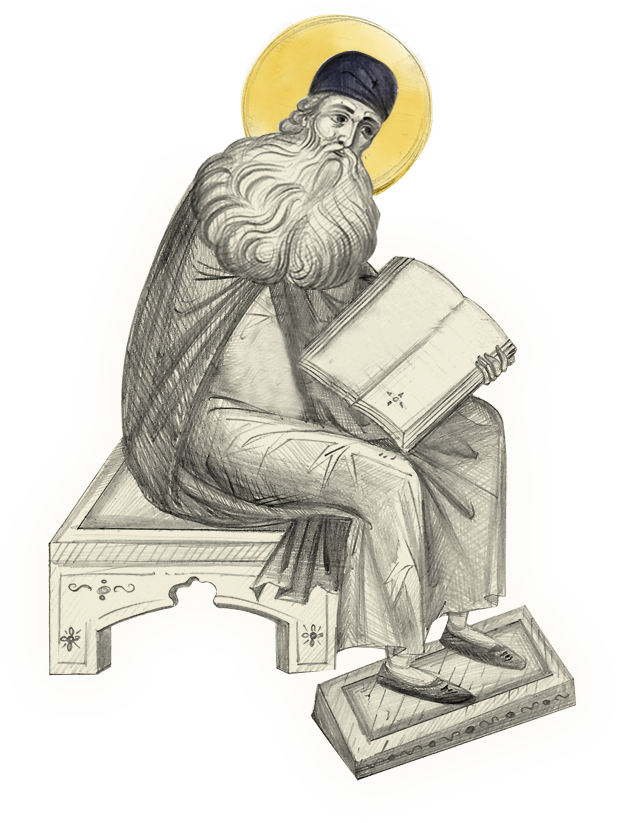 The life of Saint Maximus the Greek_Click on the feather to begin the tour
The life of Saint Maximus the Greek_Click on the feather to begin the tour Paintings
Paintings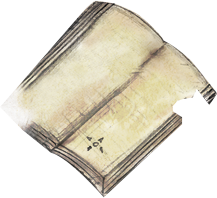


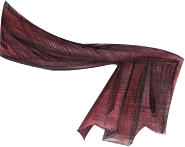
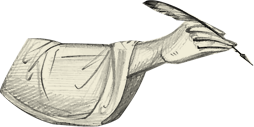
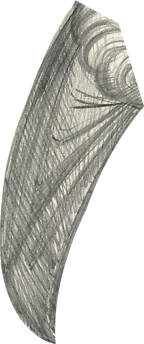
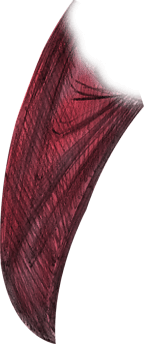
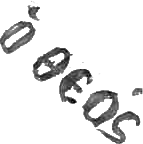
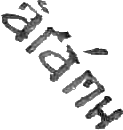



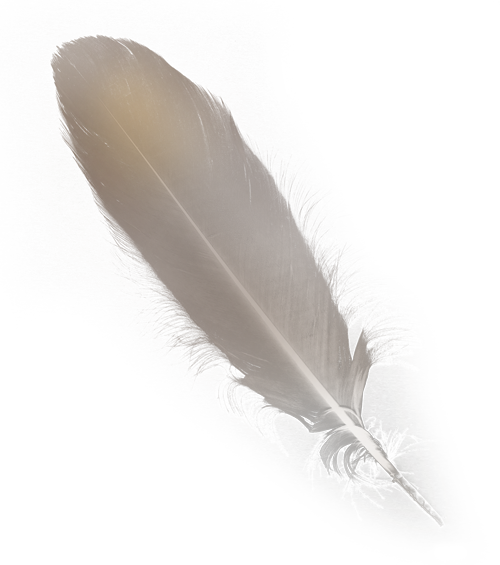



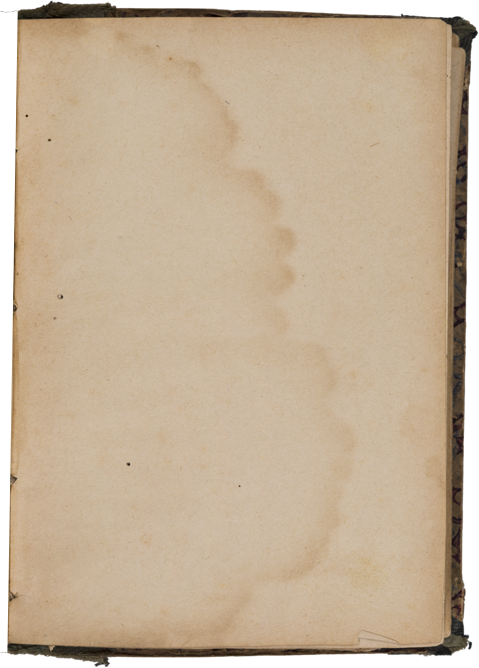

 The swan's feather
The swan's feather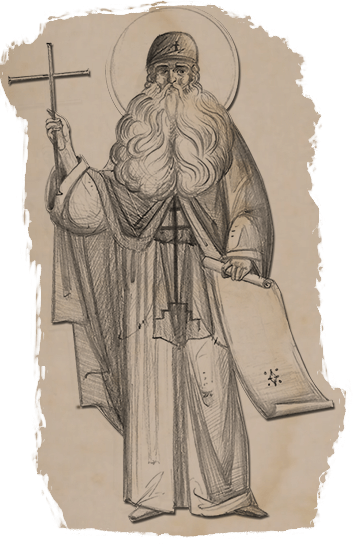

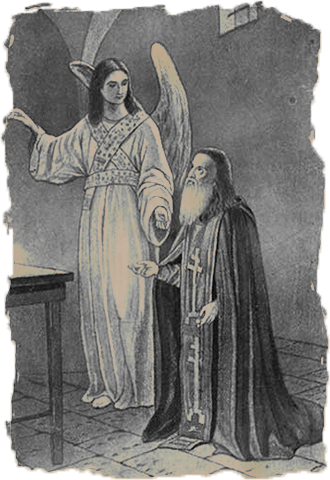
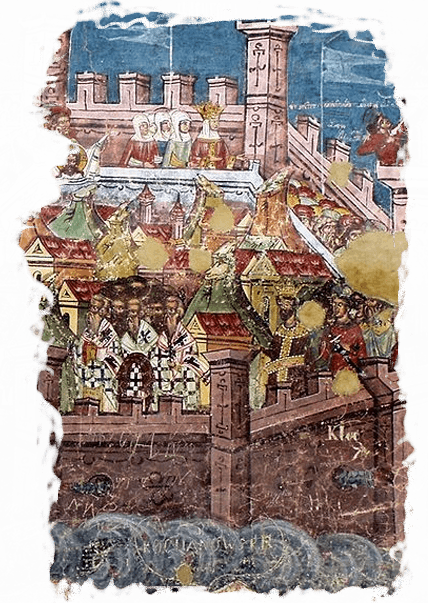

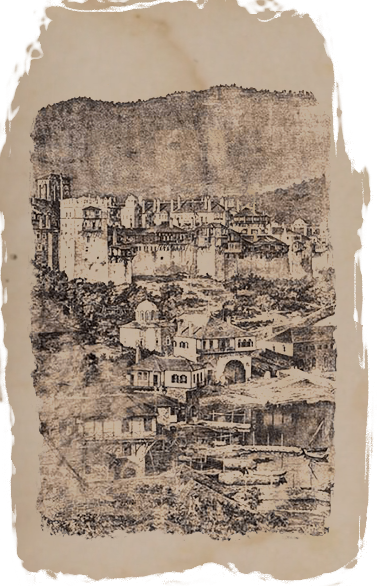
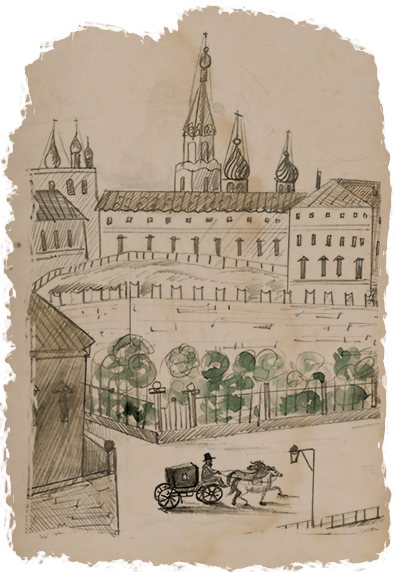
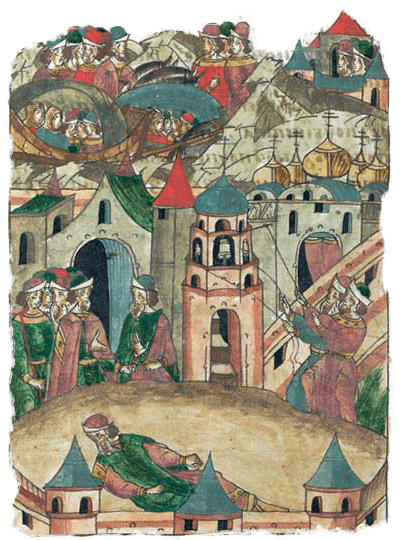
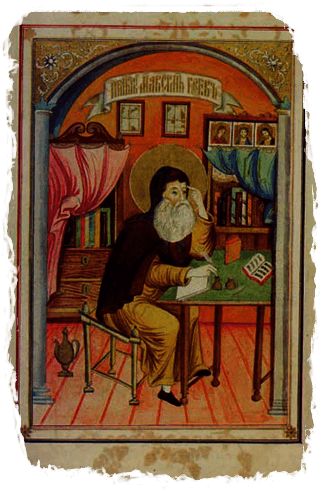
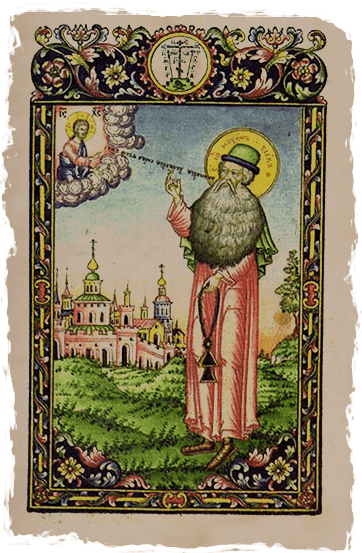
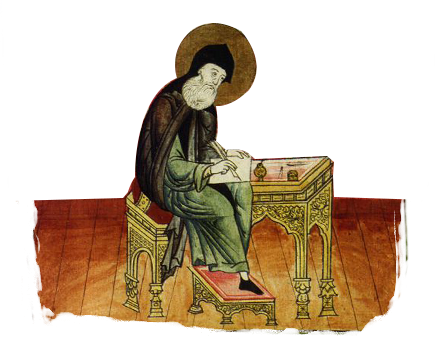
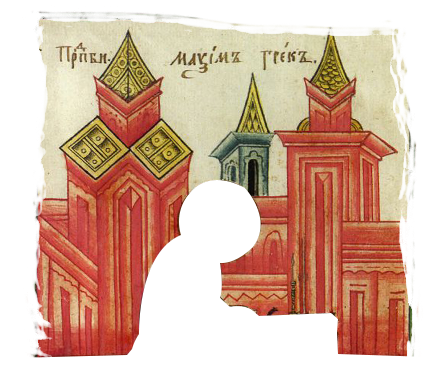
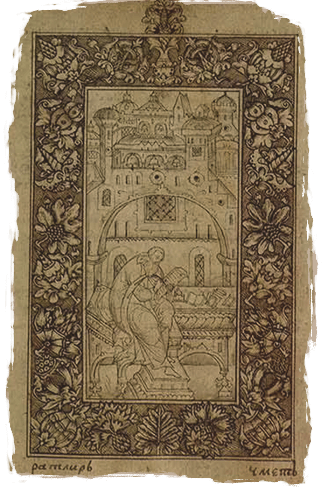
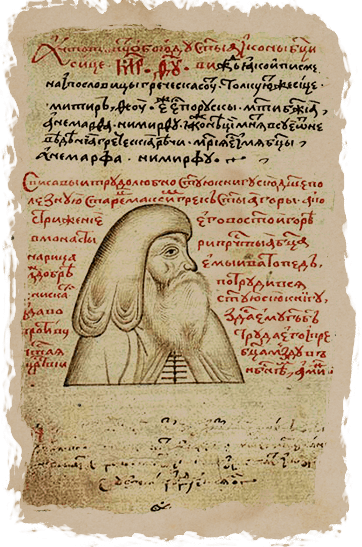
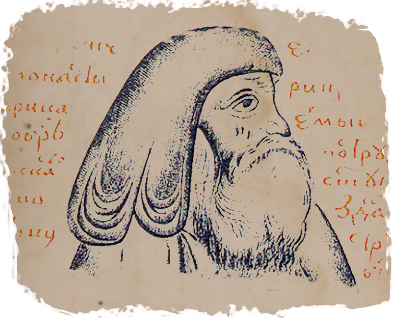 That is why I struggled, that is why I did not keep silent, when I saw it excusing the sins of the strong and taking for cheap rewards of perishable and dishonest riches and a seat at the ruler's table, flattering his megalomania. Soon I will stand before You. And if I have no excuse for my perversions, I will tell you this: I have been the most sinful Lord, but I have never been a heretic. And did not betray your plan for the world. I fought until my very last breath to ensure your Church does not lose its true flavor, even if the world rots away.
That is why I struggled, that is why I did not keep silent, when I saw it excusing the sins of the strong and taking for cheap rewards of perishable and dishonest riches and a seat at the ruler's table, flattering his megalomania. Soon I will stand before You. And if I have no excuse for my perversions, I will tell you this: I have been the most sinful Lord, but I have never been a heretic. And did not betray your plan for the world. I fought until my very last breath to ensure your Church does not lose its true flavor, even if the world rots away.

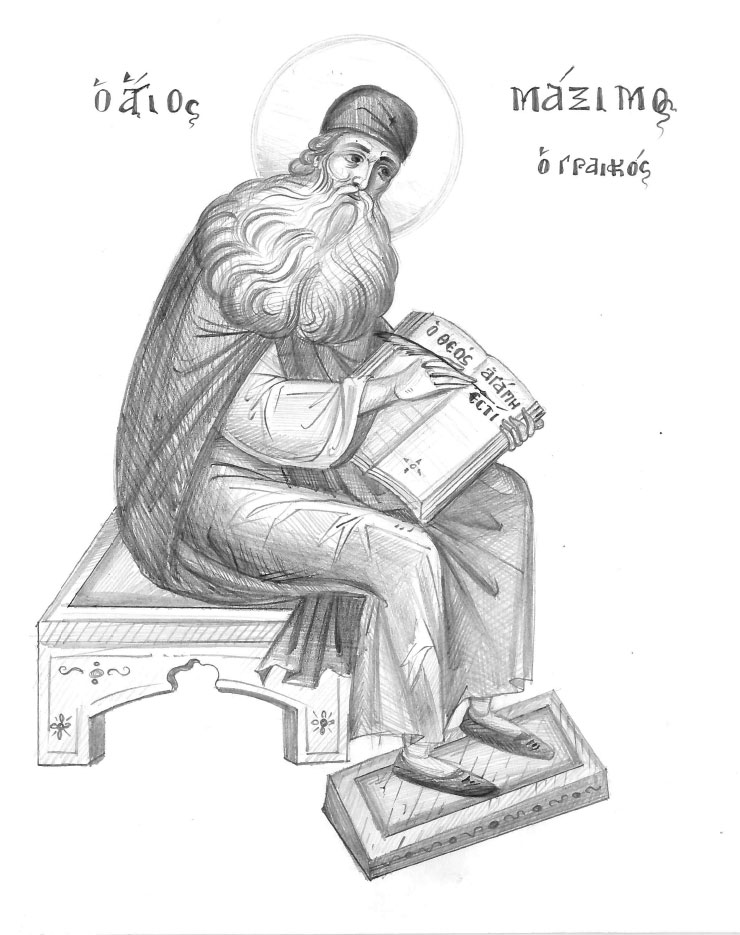 Painting
Painting

 Arta
Arta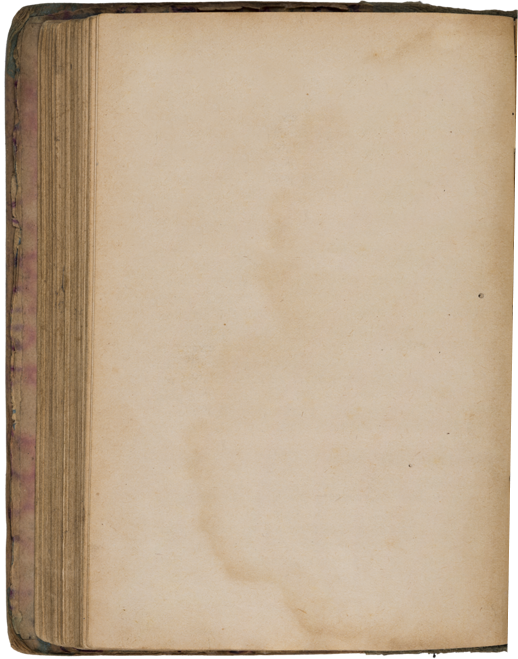

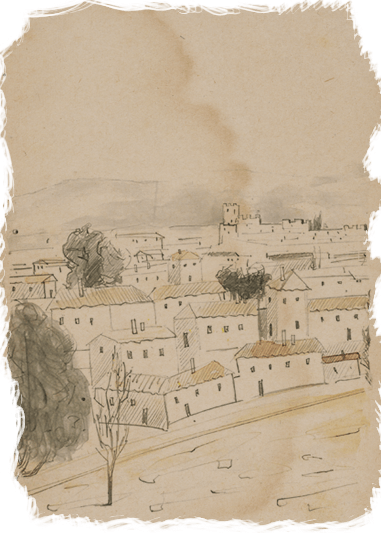
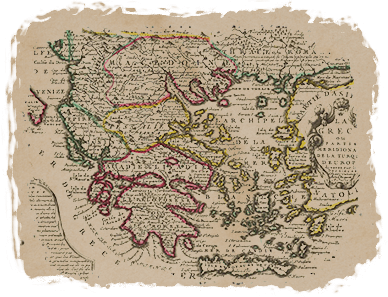

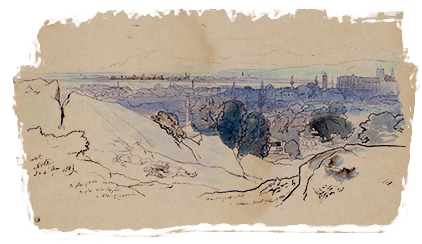
 I was born in Arta five and a half centuries ago, in 1470. Back then, it was a great city, a beautiful city. The wind carried the scent of the Epirus mountains, and the city laid like a lady in the arms of Arachthos, with its crystal clear waters flowing around her. Her wealth of great, brought by merchants passing through on their way from West to East and back again. But that trade and wealth never travelled alone. Arta became a crossroads where ideas, knowledge and thought met. And, as the whole Epirus was handed to the Turks by treaty, Arta did not experience disaster._My family had settled there before the Turks came. My mother was called Irene (Peace). My beloved father, my first teacher, was the lord Manuel Tribolis, a native of Sparta. A noble family, which had even produced a Patriarch as well as many officials who served in the Despotate of Mystras. First image I can remember is my father sitting at his wooden desk writing with his pen, a swan feather, whilst I quiet crawl around him, looking up the shelves with their leather-bound books._Από την αρχή λοιπόν της ζωής μου, οι ευκαιρίες μου για μόρφωση βαθιά και ζωή ξεχωριστή ήταν πολλές. Σε εποχές μεγάλης αμάθειας για τους συμπατριώτες μου, εγώ είχα στη διάθεσή μου τη σοφία του πατέρα μου, τη βοήθεια ξεχωριστών δασκάλων που σχεδόν καθημερινά βρισκόντουσαν στο σπίτι μου, αλλά και μια μεγάλη, τη μεγαλύτερη βιβλιοθήκη της Ηπείρου, για να μελετώ, από παιδάκι ακόμη, την παλιά και την νέα σοφία. Δεν γεννήθηκα όμως μόνον σε σπίτι φιλοσόφων, αλλά Ελλήνων και Χριστιανών. _I was taught Orthodox piety and I linked forever a love of learning with pride in my Greek descent and my true Orthodox faith. Neither ever refused me. Endless hours of study. Little rest. And the sweetest time, the walk on the bridges of Arachthos. I always adored the bridges. Perhaps because God had sent me to serve as a bridge between two worlds. To leave a land, to cross turbulent waters, to touch another land and make it a new home._And when I walked back and forth on one of the bridges, it was as if I could hear a voice: "Without sacrifice, the bridge does not stand... Without sacrifice, the bridge does not stand". I quickly spread my wings. In the early 1480s I found myself in Corfu, where I was welcomed by my uncle, Dimitrios Trivolis. My great teacher there was John Moschos, a student of the great sage Plethon Gemistus, from Mystras. Another world, cosmopolitan life and preparation to enter the gates to Europe._
I was born in Arta five and a half centuries ago, in 1470. Back then, it was a great city, a beautiful city. The wind carried the scent of the Epirus mountains, and the city laid like a lady in the arms of Arachthos, with its crystal clear waters flowing around her. Her wealth of great, brought by merchants passing through on their way from West to East and back again. But that trade and wealth never travelled alone. Arta became a crossroads where ideas, knowledge and thought met. And, as the whole Epirus was handed to the Turks by treaty, Arta did not experience disaster._My family had settled there before the Turks came. My mother was called Irene (Peace). My beloved father, my first teacher, was the lord Manuel Tribolis, a native of Sparta. A noble family, which had even produced a Patriarch as well as many officials who served in the Despotate of Mystras. First image I can remember is my father sitting at his wooden desk writing with his pen, a swan feather, whilst I quiet crawl around him, looking up the shelves with their leather-bound books._Από την αρχή λοιπόν της ζωής μου, οι ευκαιρίες μου για μόρφωση βαθιά και ζωή ξεχωριστή ήταν πολλές. Σε εποχές μεγάλης αμάθειας για τους συμπατριώτες μου, εγώ είχα στη διάθεσή μου τη σοφία του πατέρα μου, τη βοήθεια ξεχωριστών δασκάλων που σχεδόν καθημερινά βρισκόντουσαν στο σπίτι μου, αλλά και μια μεγάλη, τη μεγαλύτερη βιβλιοθήκη της Ηπείρου, για να μελετώ, από παιδάκι ακόμη, την παλιά και την νέα σοφία. Δεν γεννήθηκα όμως μόνον σε σπίτι φιλοσόφων, αλλά Ελλήνων και Χριστιανών. _I was taught Orthodox piety and I linked forever a love of learning with pride in my Greek descent and my true Orthodox faith. Neither ever refused me. Endless hours of study. Little rest. And the sweetest time, the walk on the bridges of Arachthos. I always adored the bridges. Perhaps because God had sent me to serve as a bridge between two worlds. To leave a land, to cross turbulent waters, to touch another land and make it a new home._And when I walked back and forth on one of the bridges, it was as if I could hear a voice: "Without sacrifice, the bridge does not stand... Without sacrifice, the bridge does not stand". I quickly spread my wings. In the early 1480s I found myself in Corfu, where I was welcomed by my uncle, Dimitrios Trivolis. My great teacher there was John Moschos, a student of the great sage Plethon Gemistus, from Mystras. Another world, cosmopolitan life and preparation to enter the gates to Europe._
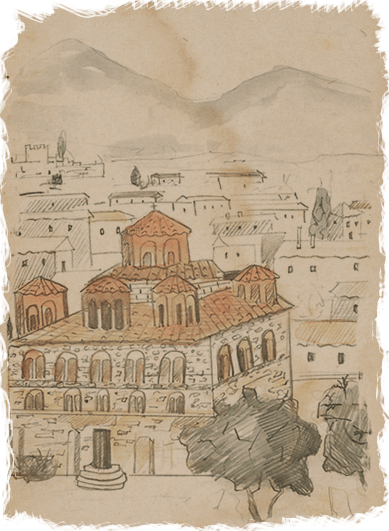
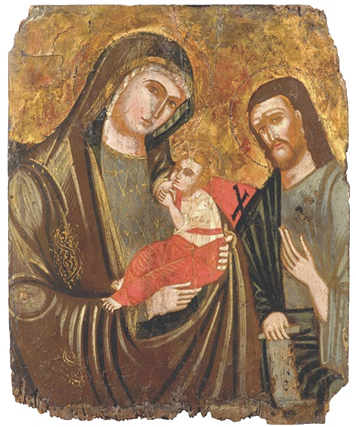
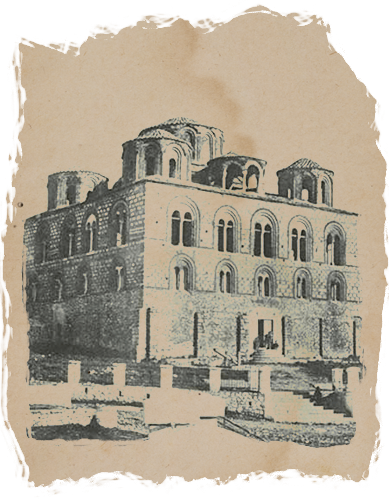
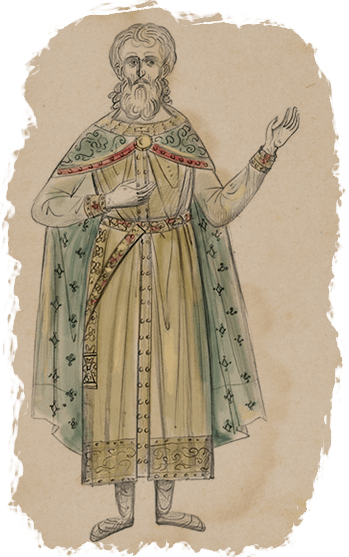
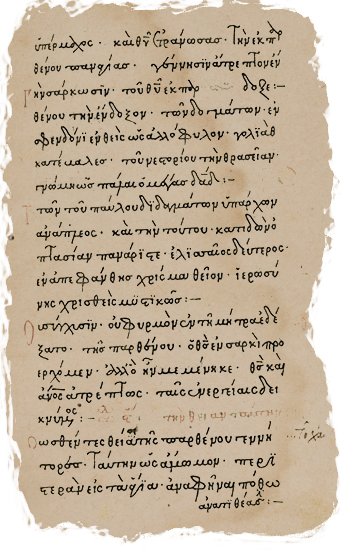

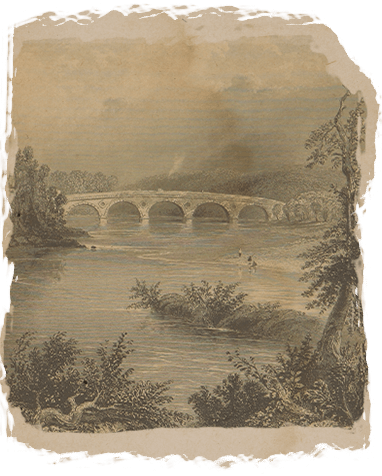
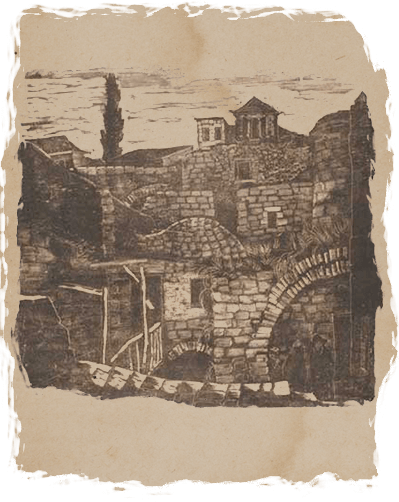
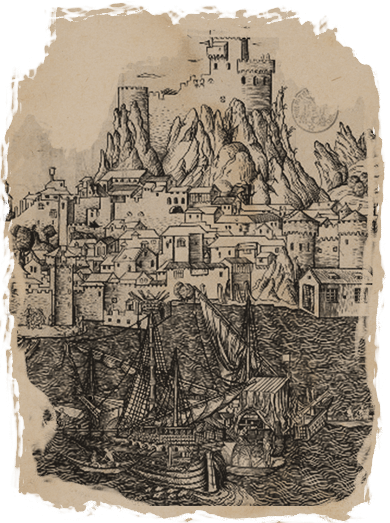

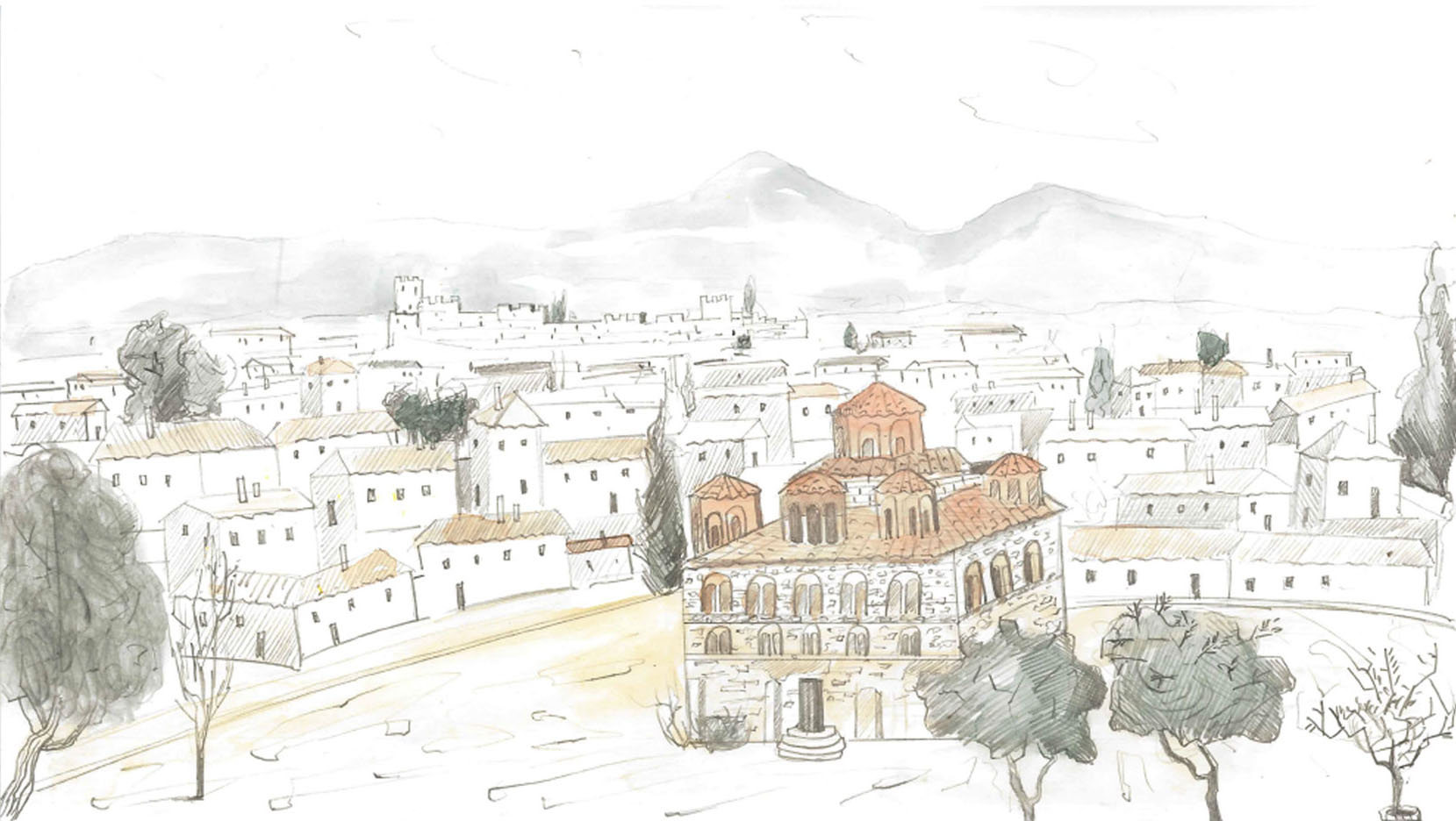 Painting
Painting

 Italy
Italy

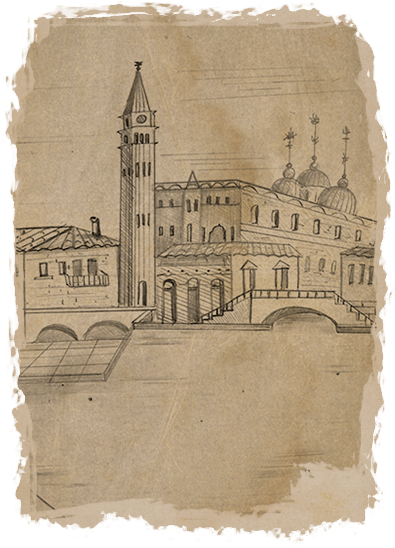
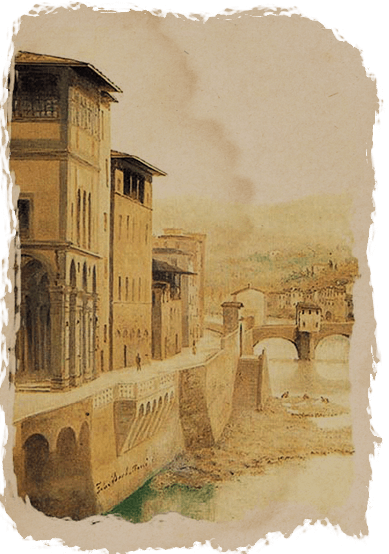
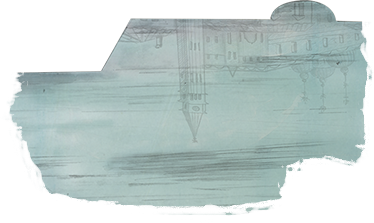

 How is it to leave the yard of your home and open the way to the vast plain for the first time? This is how I felt, Michael Trivolis, the aristocrat from Arta, when I first set foot in Venice, the second Byzantium, as it were. And indeed, there were moments when I thought I was on Greek soil , and indeed in the era of Socrates and Pericles. Everywhere was worship for all that was ancient Greek. I felt proud of my ancestors and I was determined to be worthy of them. I took intensive classes of Latin and Italian and I became a devoted attendee of courses on the great Byzantine sages who had found shelter in the West after the fall of the City._
How is it to leave the yard of your home and open the way to the vast plain for the first time? This is how I felt, Michael Trivolis, the aristocrat from Arta, when I first set foot in Venice, the second Byzantium, as it were. And indeed, there were moments when I thought I was on Greek soil , and indeed in the era of Socrates and Pericles. Everywhere was worship for all that was ancient Greek. I felt proud of my ancestors and I was determined to be worthy of them. I took intensive classes of Latin and Italian and I became a devoted attendee of courses on the great Byzantine sages who had found shelter in the West after the fall of the City._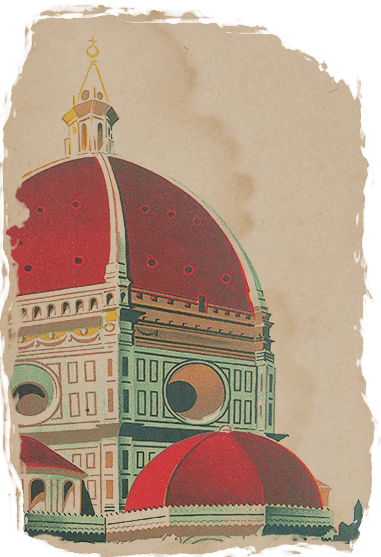
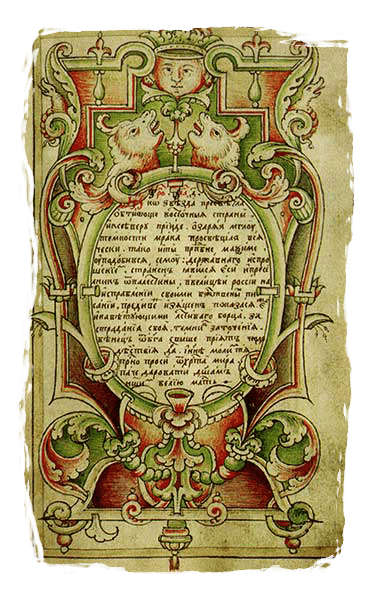
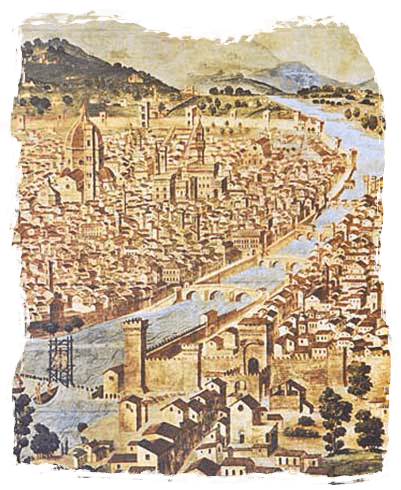
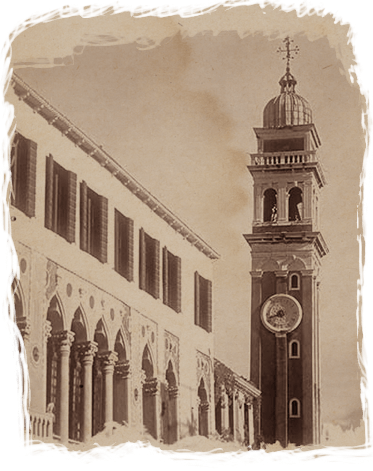
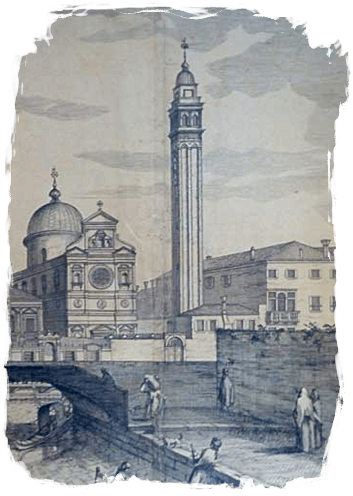
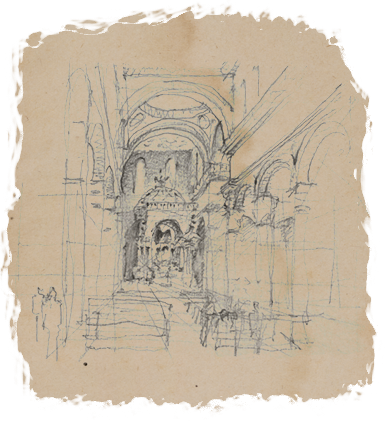
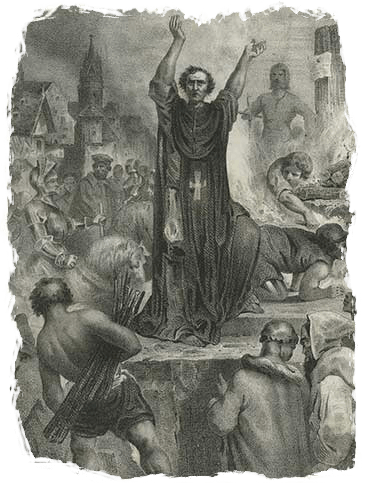
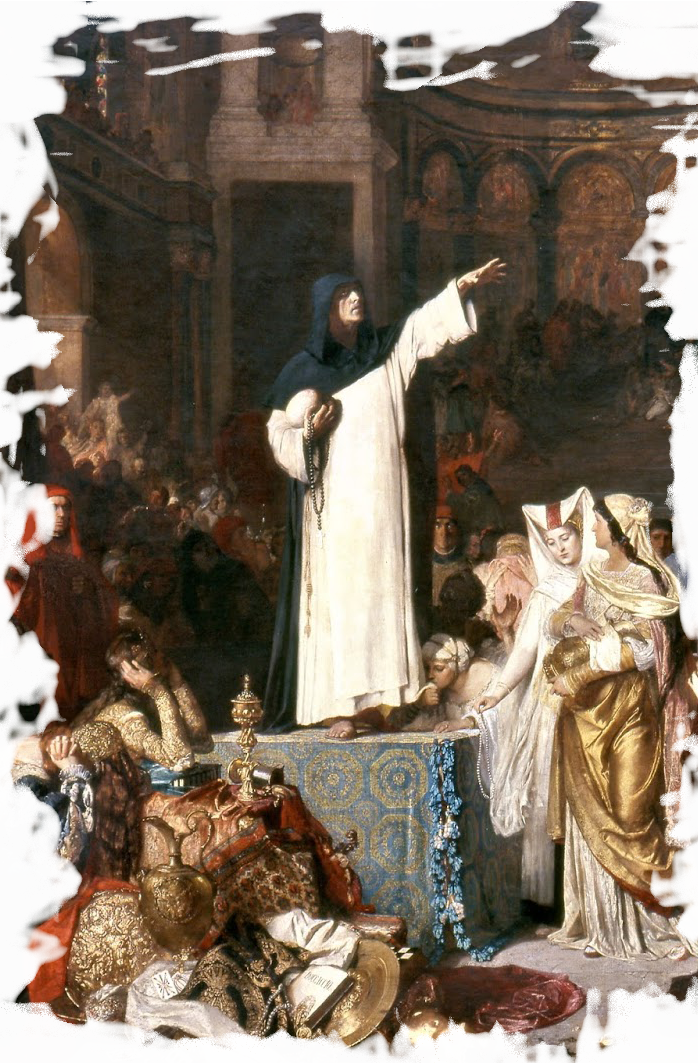
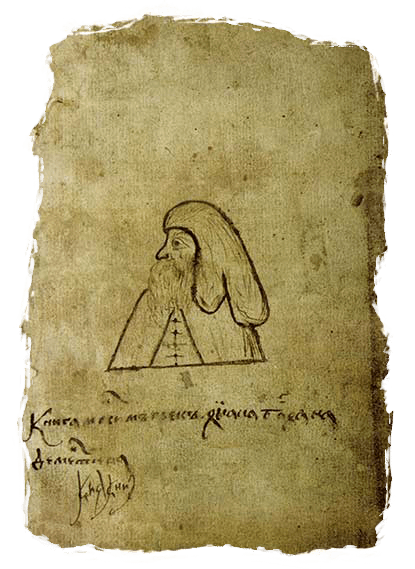
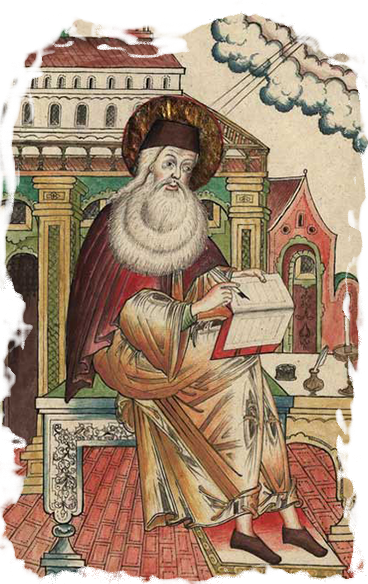
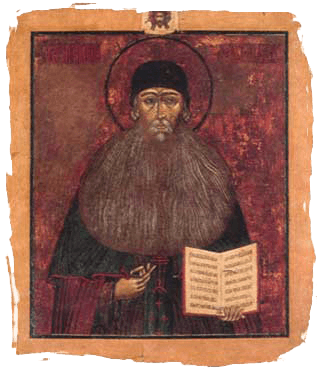





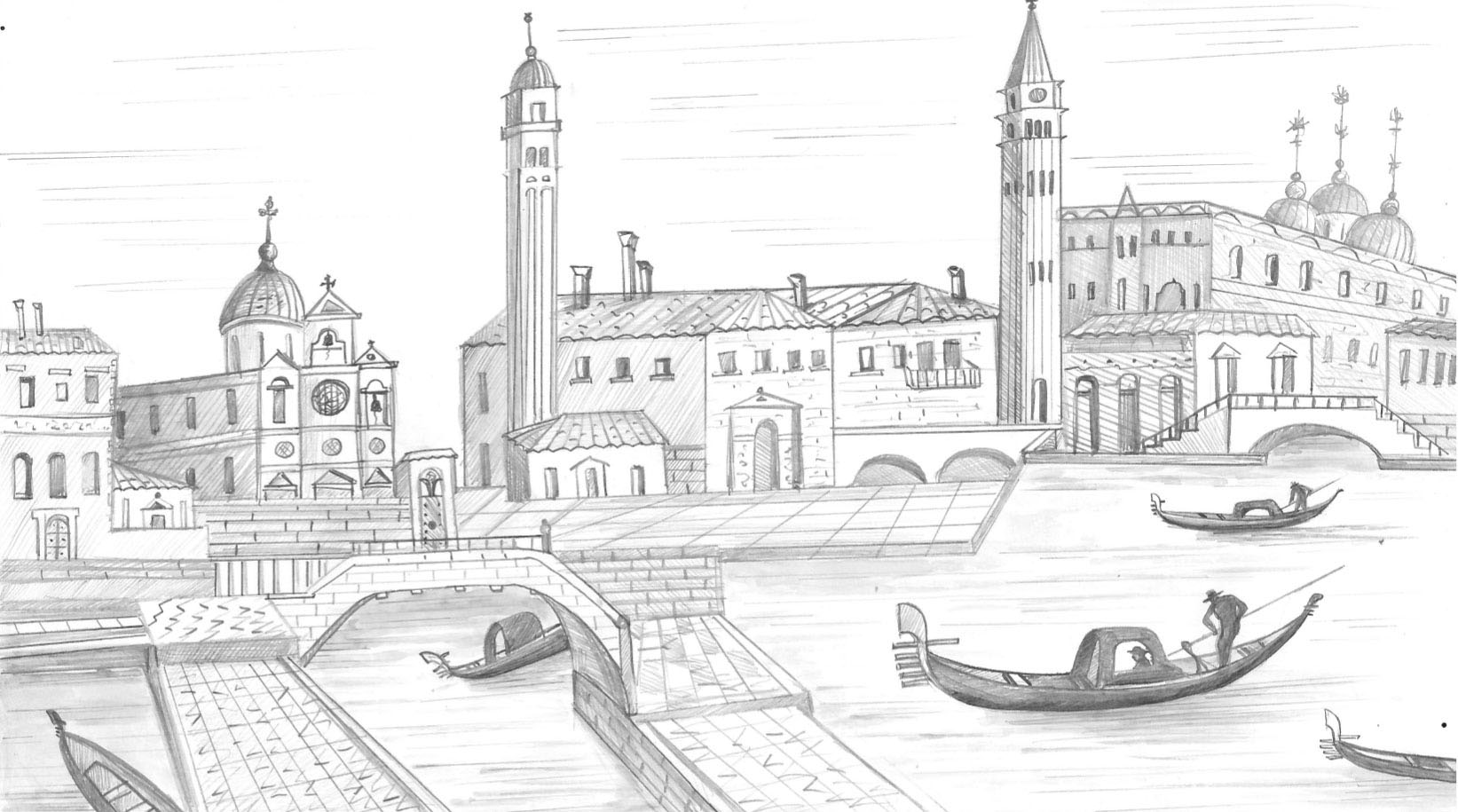




 Mount Athos
Mount Athos
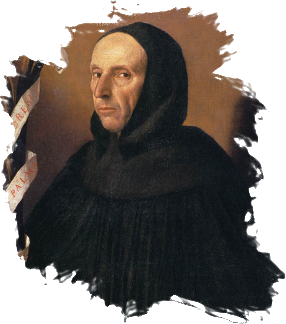
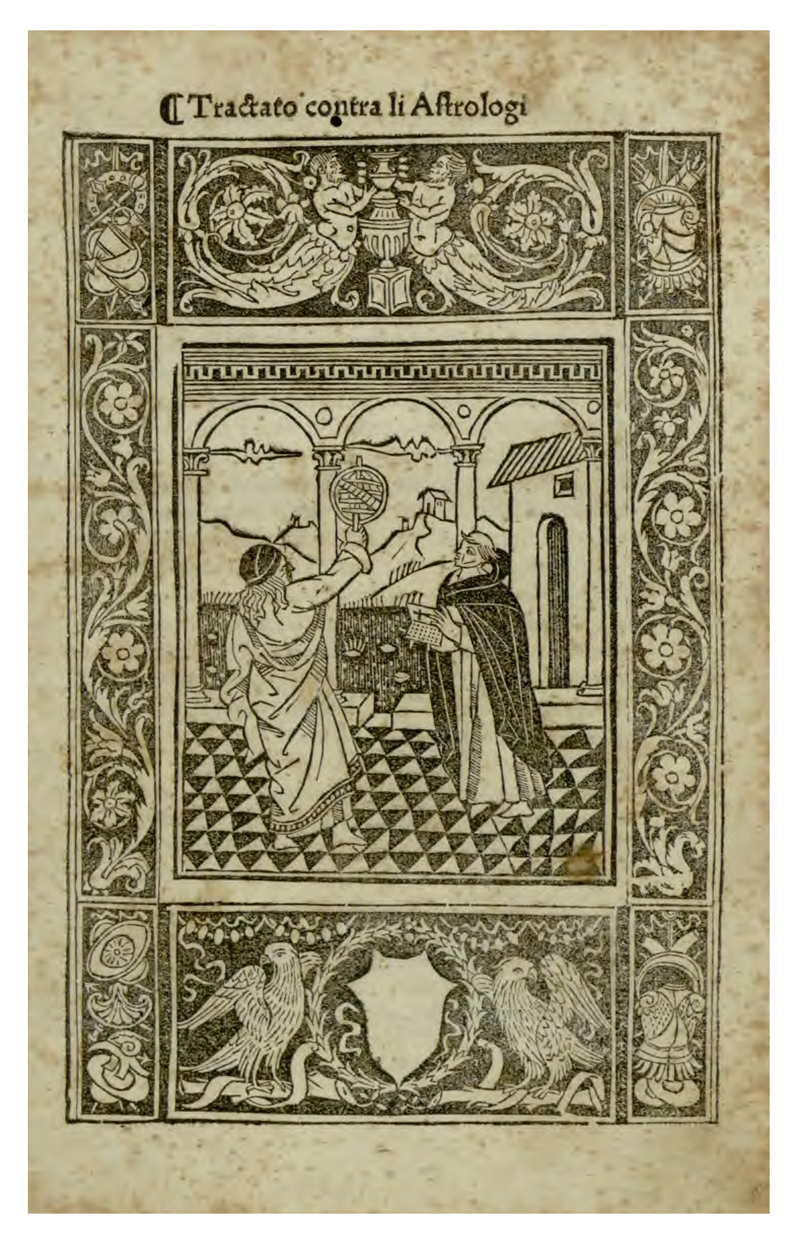
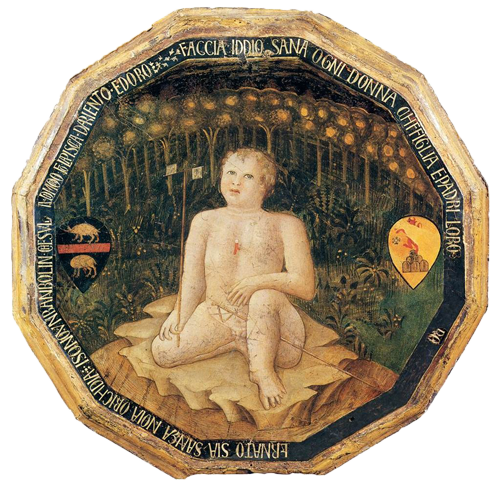
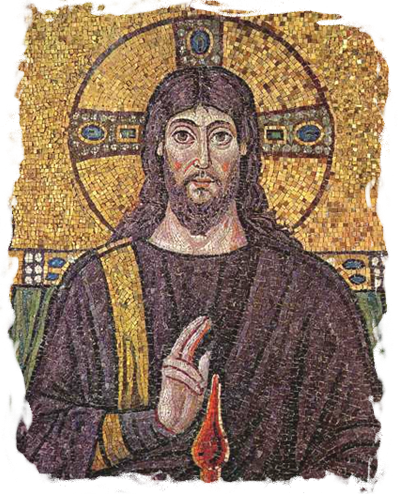
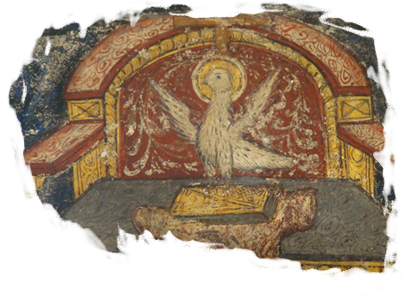

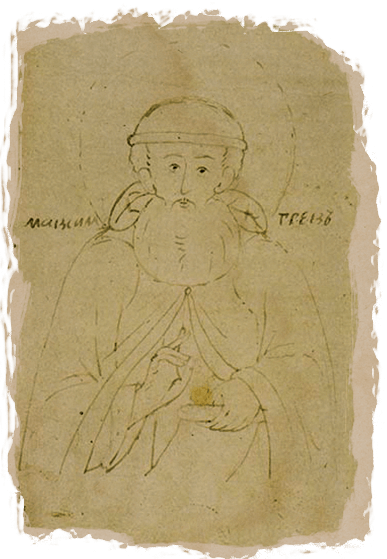
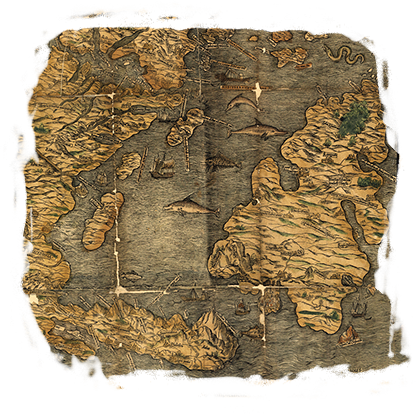
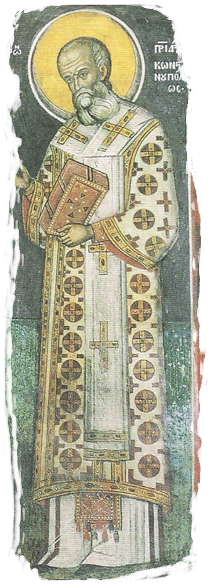
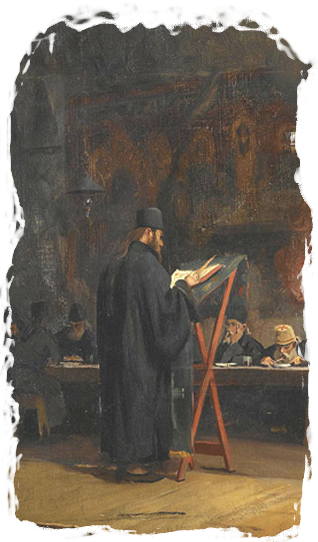
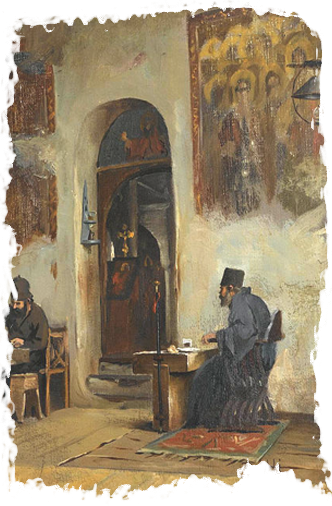

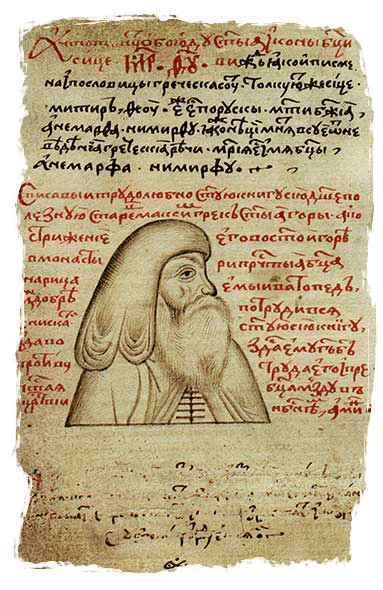
 I stayed for twelve years in the Italian cities. I met many wise men, many rulers, many eminent nobles. But no one shook me as much as the monk Savonarola, the witness of the Renaissance. Yes, he was a Latin monk, but I am sure that under other circumstances he could have been one of the most brilliant stars of Orthodox monasticism. He belonged to a Christian Church which had been deceived and had long since lost the flame of Orthodox piety. But I could not helped but be impressed by his ascetism, his directness, his courage and his integrity to the end._Every year that I passed in Italy further confirmed to me , that there was no wisdom superior to that given by a living relationship with Christ. Within that relationship could be found the answers to all the great and the small "whys" of life. Little by little I realised the futility of worldly knowledge, and the more I where a life leads to, if it is cut off from faith and piety. Without fully understanding it, I concluded that if what I found is true, I must truly act upon it and live a life consistent with that truth. _For was almost half my lifetime - if one can make such calculations - my soul had been seeking the ultimate. I measured the human forces that surrounded me in sin: without God, man is a slave to his passions and temptations. If God, who cares for the salvation of all men, had not quickly shown me His mercy and had not granted me His grace by illuminating my mind, I would have long before been lost to the disrespectful people I met in Italy. A voice in me was crying: "All or nothing"_More and more I saw in my dreams the robe of the hanged monk. I still hesitated. Was God sending me the temptation of vanity? In 1505, I came to a conclusion and I left Italy. The first stop was my beloved Arta. It was such a powerful emotional experience! It took me a year before I could tear myself away from my ancestors, but in 1506 I reached my decision. I followed my heart and arrived at Mount Athos. From the beginning, Vatopedi had been designated my destination. It was not that it had the richest library, or the greatest number of monks. _I had all these things. For me, what counted was the presence of the former Ecumenical Patriarch Niphon, who was a beloved friend of my family, A Holy man! He welcomed me, but also warned me of the difficulty of monastic life. I reassured him and convinced him. And so, I became a monk and was given the name "Maximus". My life changed. I, the eminent scholar, embarked upon a life at the extreme. I, the student of codes, began to zealously practice virtues. The wanderer and lord, I began to deal with the dissolution of the same will. _The learner in the discussions and symposia, I found myself practicing the quietness of God. The man accustomed to the comforts of life embraced abstinence. And when my elder monk asked me to start tours, collecting money for the Monastery needs, I accepted the humiliation with joy, free from the bitter glory of men. I always preached our Orthodox faith openly and without hesitation to the lords, whether they were enlightened or not by the Grace of the Holy Spirit.In short, wherever the Fathers of the Holy Monastery of Vatopedi, sent me, I was enlightened by the Grace of the Holy Spirit and preached the pure Orthodox faith, and those who paid according to their ability set me on the road to return to Mount Athos. And just then, temptation whispered that I was ... someone, I was witness to the martyrdom of a young child, a new martyr, who did not hesitate to sacrifice himself in a terrible manner for his faith. Once again, the form of Savonarola presented itself to me and I was led to humiliation and self-immolation._So, time flowed between the inner life and the missions assigned to me by the Fathers. I believed that that was I would live out the rest of my days. Here, forever here, in blessed Vatopedi. I was not looking for anything else.
I stayed for twelve years in the Italian cities. I met many wise men, many rulers, many eminent nobles. But no one shook me as much as the monk Savonarola, the witness of the Renaissance. Yes, he was a Latin monk, but I am sure that under other circumstances he could have been one of the most brilliant stars of Orthodox monasticism. He belonged to a Christian Church which had been deceived and had long since lost the flame of Orthodox piety. But I could not helped but be impressed by his ascetism, his directness, his courage and his integrity to the end._Every year that I passed in Italy further confirmed to me , that there was no wisdom superior to that given by a living relationship with Christ. Within that relationship could be found the answers to all the great and the small "whys" of life. Little by little I realised the futility of worldly knowledge, and the more I where a life leads to, if it is cut off from faith and piety. Without fully understanding it, I concluded that if what I found is true, I must truly act upon it and live a life consistent with that truth. _For was almost half my lifetime - if one can make such calculations - my soul had been seeking the ultimate. I measured the human forces that surrounded me in sin: without God, man is a slave to his passions and temptations. If God, who cares for the salvation of all men, had not quickly shown me His mercy and had not granted me His grace by illuminating my mind, I would have long before been lost to the disrespectful people I met in Italy. A voice in me was crying: "All or nothing"_More and more I saw in my dreams the robe of the hanged monk. I still hesitated. Was God sending me the temptation of vanity? In 1505, I came to a conclusion and I left Italy. The first stop was my beloved Arta. It was such a powerful emotional experience! It took me a year before I could tear myself away from my ancestors, but in 1506 I reached my decision. I followed my heart and arrived at Mount Athos. From the beginning, Vatopedi had been designated my destination. It was not that it had the richest library, or the greatest number of monks. _I had all these things. For me, what counted was the presence of the former Ecumenical Patriarch Niphon, who was a beloved friend of my family, A Holy man! He welcomed me, but also warned me of the difficulty of monastic life. I reassured him and convinced him. And so, I became a monk and was given the name "Maximus". My life changed. I, the eminent scholar, embarked upon a life at the extreme. I, the student of codes, began to zealously practice virtues. The wanderer and lord, I began to deal with the dissolution of the same will. _The learner in the discussions and symposia, I found myself practicing the quietness of God. The man accustomed to the comforts of life embraced abstinence. And when my elder monk asked me to start tours, collecting money for the Monastery needs, I accepted the humiliation with joy, free from the bitter glory of men. I always preached our Orthodox faith openly and without hesitation to the lords, whether they were enlightened or not by the Grace of the Holy Spirit.In short, wherever the Fathers of the Holy Monastery of Vatopedi, sent me, I was enlightened by the Grace of the Holy Spirit and preached the pure Orthodox faith, and those who paid according to their ability set me on the road to return to Mount Athos. And just then, temptation whispered that I was ... someone, I was witness to the martyrdom of a young child, a new martyr, who did not hesitate to sacrifice himself in a terrible manner for his faith. Once again, the form of Savonarola presented itself to me and I was led to humiliation and self-immolation._So, time flowed between the inner life and the missions assigned to me by the Fathers. I believed that that was I would live out the rest of my days. Here, forever here, in blessed Vatopedi. I was not looking for anything else.

 Painting
Painting



 Russia
Russia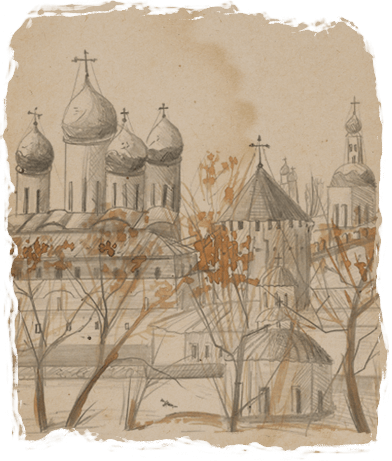
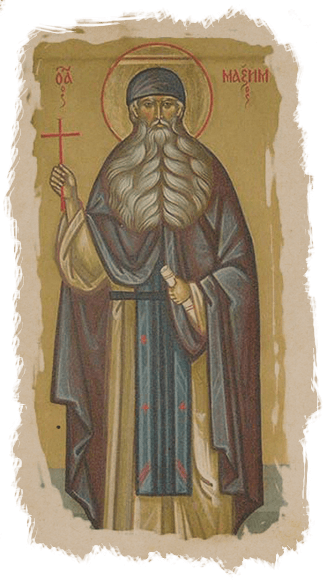
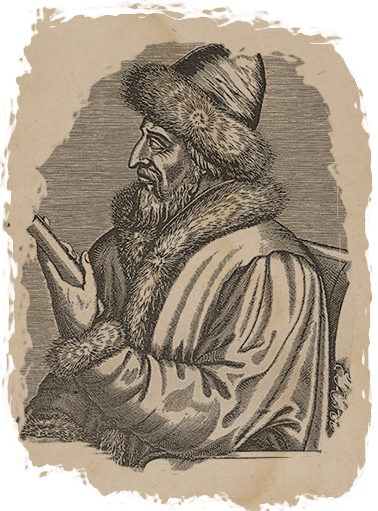
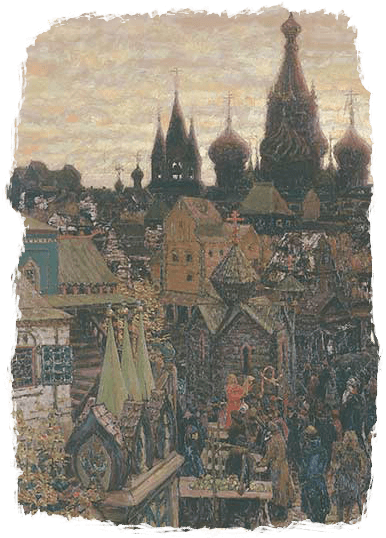
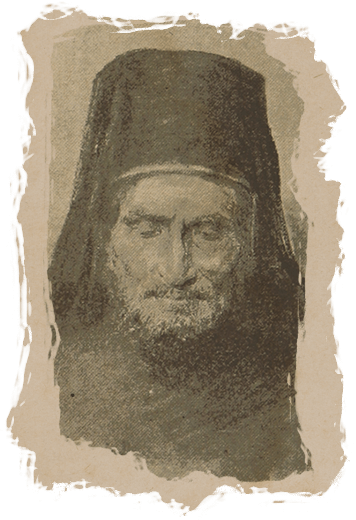


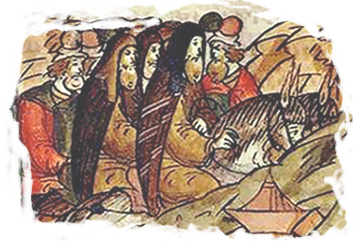
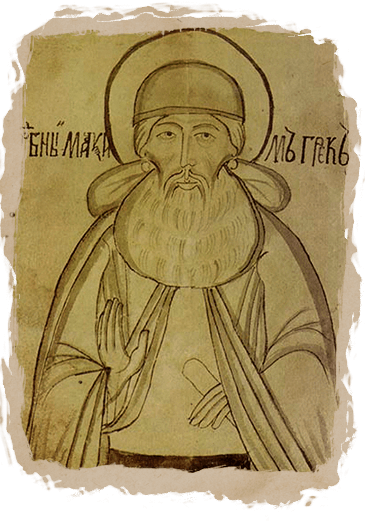
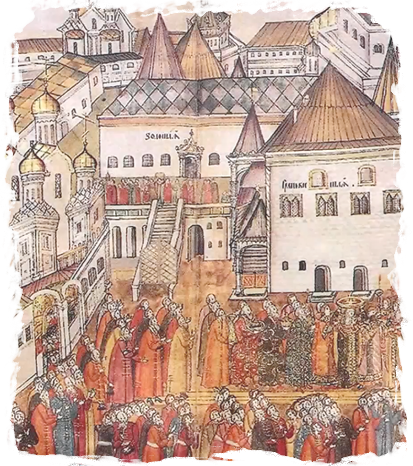
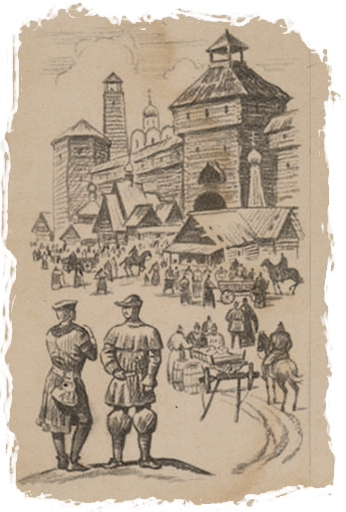
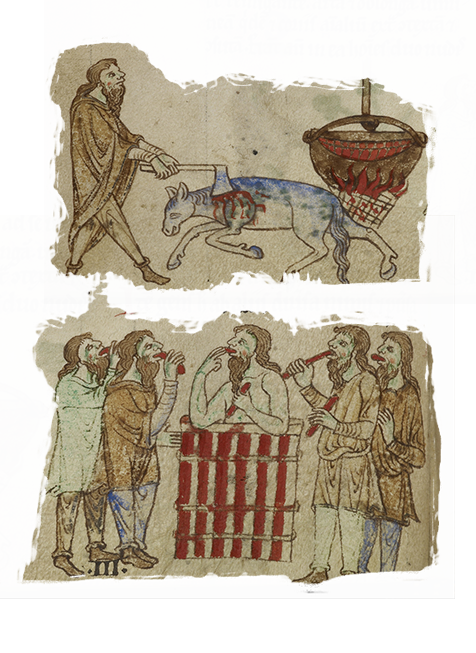
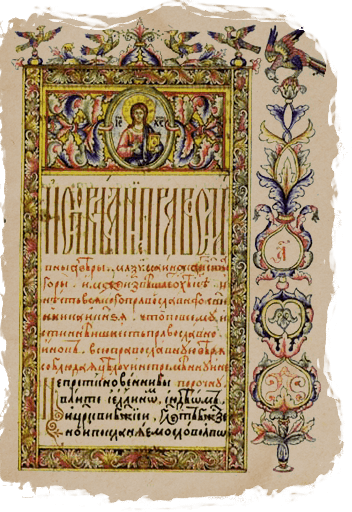
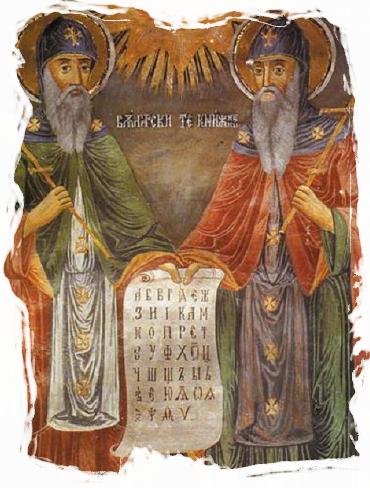
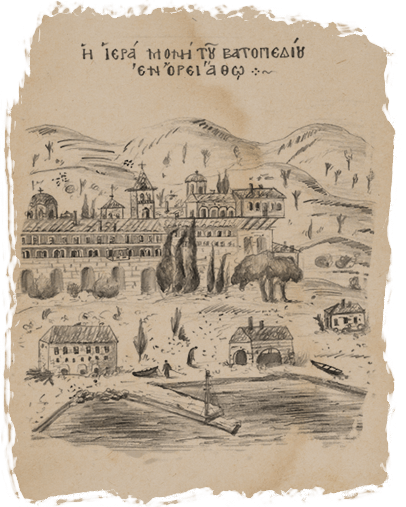
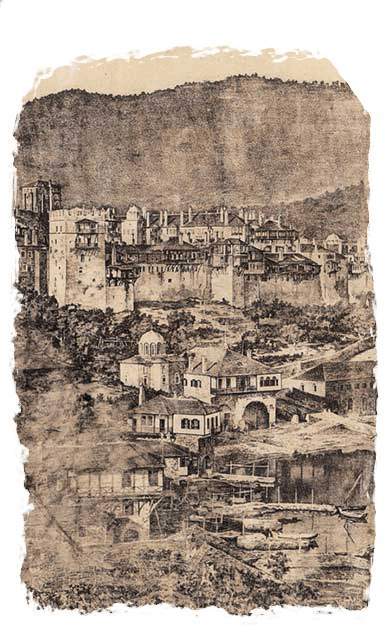
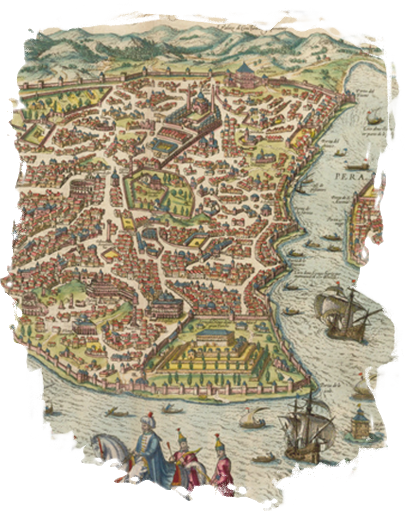
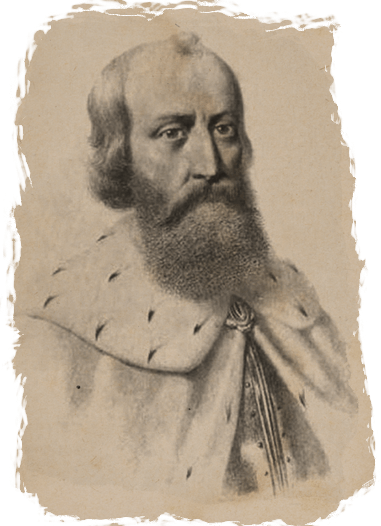

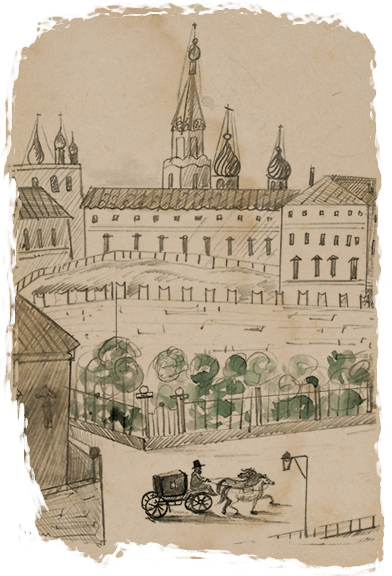
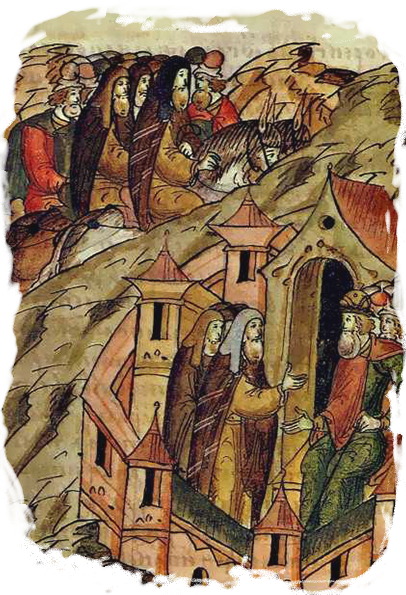
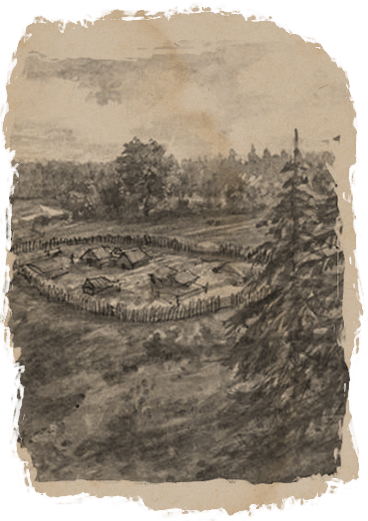

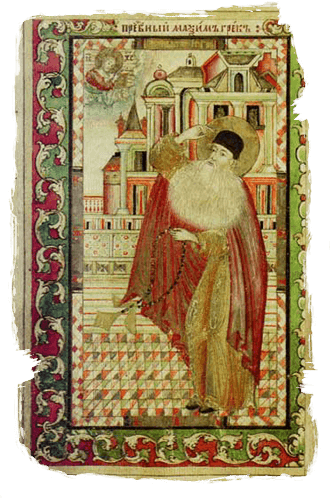
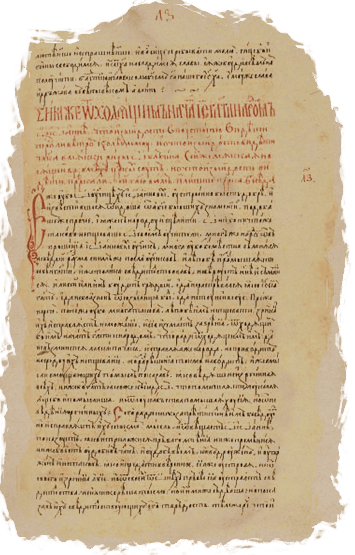
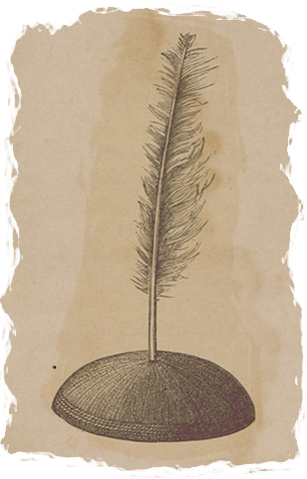
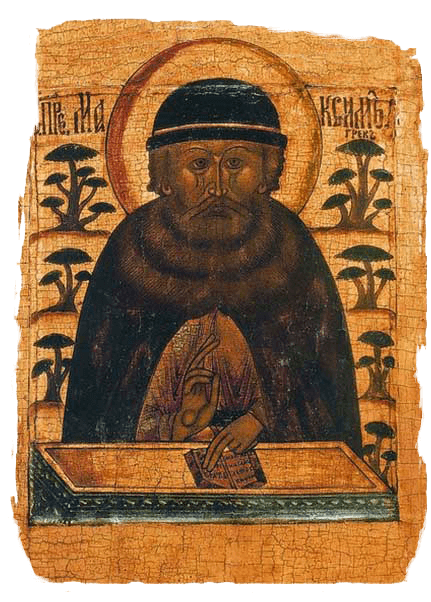 Lord, Lord, support me!
Lord, Lord, support me! I was born in Arta. I studied in Italy. At Vatopaidi, I wanted to become a monk. So far, I had been grateful to God, and I wholeheartedly surrendered every moment to His will. But when the invitation arrived from the great Duke of the Kingdom, the Tsar's son and heir, something within me rebelled, whispering to me: "This is not of God." And on the other hand, I thought "Is there anything that is not of You, Lord?". The invitation was not initially for me, of course, but for my elder brother, Monk Savva, who knew Russian. That was who the great Duke was asking to go to Moscow and take over the correction of ecclesiastical books. But when it turned out that the trip would exhaust his meagre strength, everyone turned to me.I refused, twice, three times. It was not the journey that frightened me. I had made many travels but there was always the sweet hour of return. I had a bad feeling about this trip. And then, there were so many tasks I had on the Mount! But above all, I did not know Russian. These were my arguments. The Holy Abbot of the Monastery, Anthimos, and all the representatives of the Holy Monasteries, listened to me with understanding, but when they spoke, I realized that there was a greater purpose hidden behind the invitation: Everyone believed that great Russia was the big hope for our Order. For this reason, her ruler should not be displeased with a denial.But Russia itself had to do it intellectually. I knew from what I had learned from Russian monks that she suffered from ignorance, a short age of books and mental blackout. Throughout Russia, hidden Bibles revealed with incredible teachings and events carrying the signatures of the so-called Fathers of the Church Paganism had infiltrated all the Christian feasts. Magic was raging.
I was born in Arta. I studied in Italy. At Vatopaidi, I wanted to become a monk. So far, I had been grateful to God, and I wholeheartedly surrendered every moment to His will. But when the invitation arrived from the great Duke of the Kingdom, the Tsar's son and heir, something within me rebelled, whispering to me: "This is not of God." And on the other hand, I thought "Is there anything that is not of You, Lord?". The invitation was not initially for me, of course, but for my elder brother, Monk Savva, who knew Russian. That was who the great Duke was asking to go to Moscow and take over the correction of ecclesiastical books. But when it turned out that the trip would exhaust his meagre strength, everyone turned to me.I refused, twice, three times. It was not the journey that frightened me. I had made many travels but there was always the sweet hour of return. I had a bad feeling about this trip. And then, there were so many tasks I had on the Mount! But above all, I did not know Russian. These were my arguments. The Holy Abbot of the Monastery, Anthimos, and all the representatives of the Holy Monasteries, listened to me with understanding, but when they spoke, I realized that there was a greater purpose hidden behind the invitation: Everyone believed that great Russia was the big hope for our Order. For this reason, her ruler should not be displeased with a denial.But Russia itself had to do it intellectually. I knew from what I had learned from Russian monks that she suffered from ignorance, a short age of books and mental blackout. Throughout Russia, hidden Bibles revealed with incredible teachings and events carrying the signatures of the so-called Fathers of the Church Paganism had infiltrated all the Christian feasts. Magic was raging.
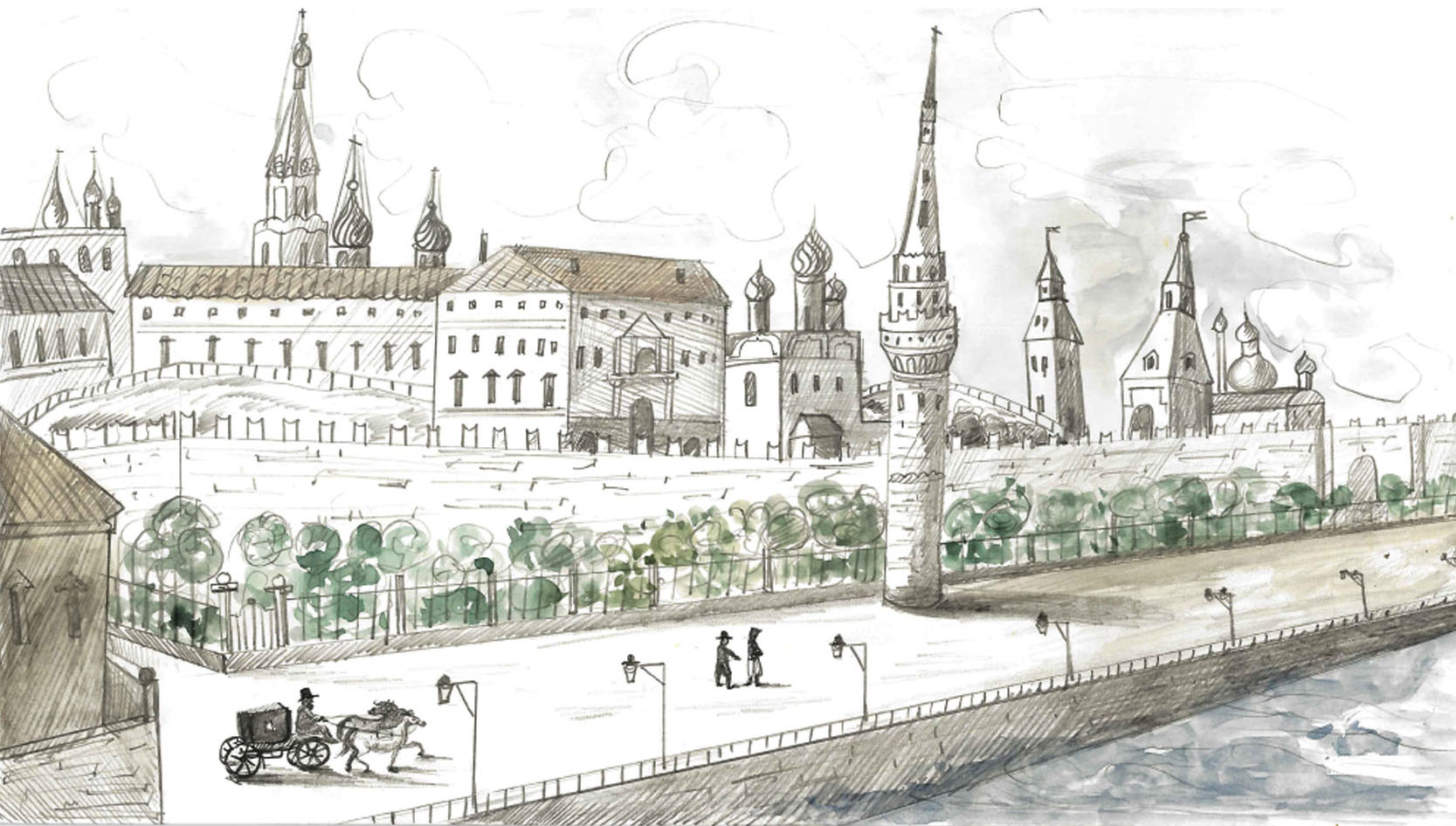 Painting
Painting



 Russia
Russia
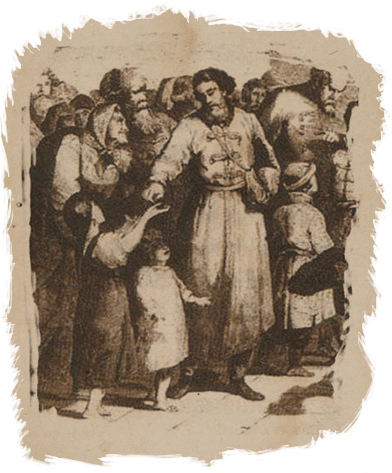
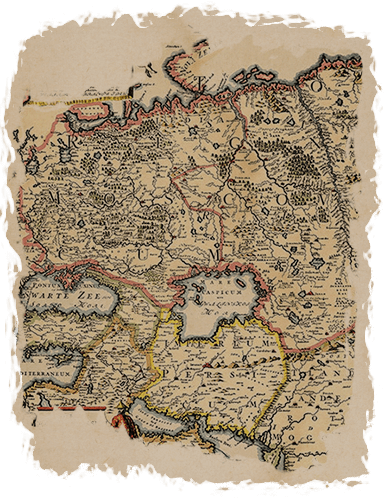


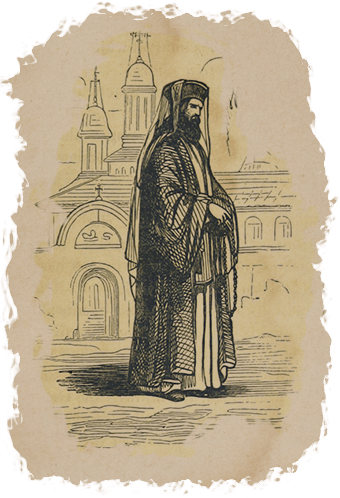
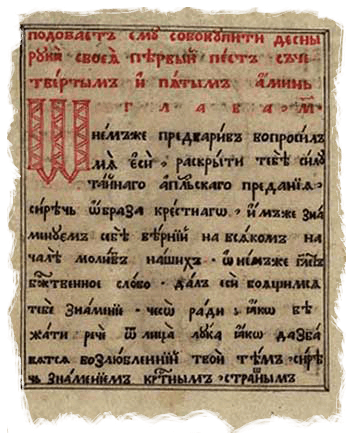
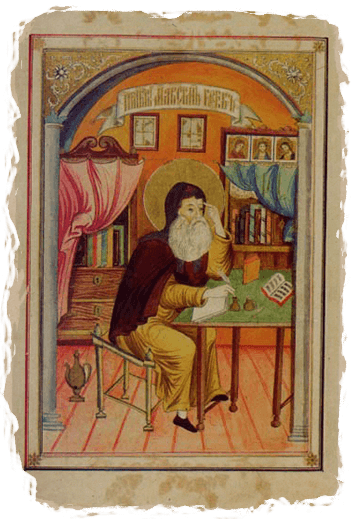
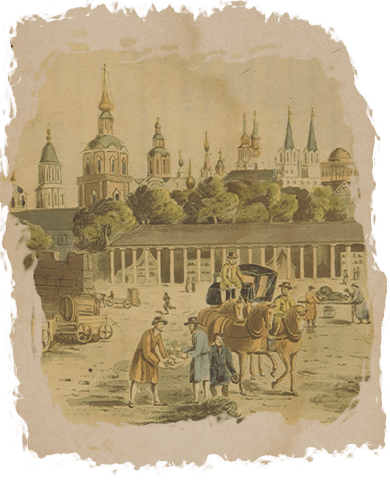
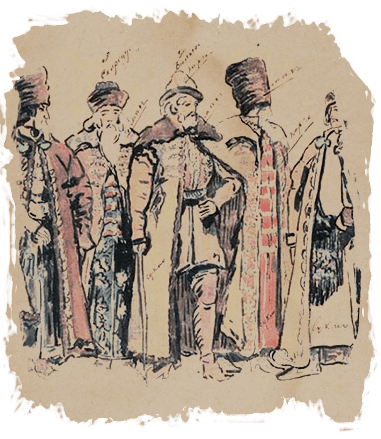
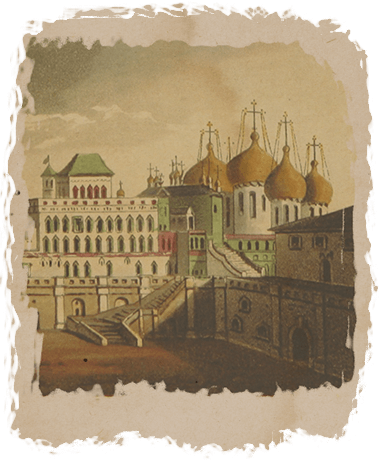
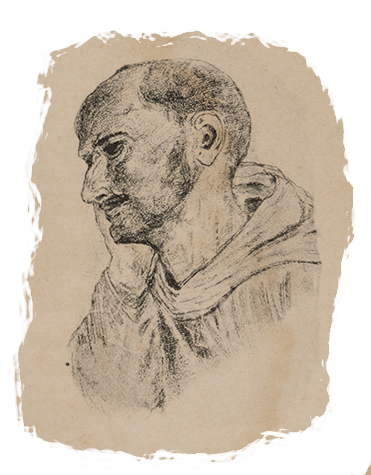
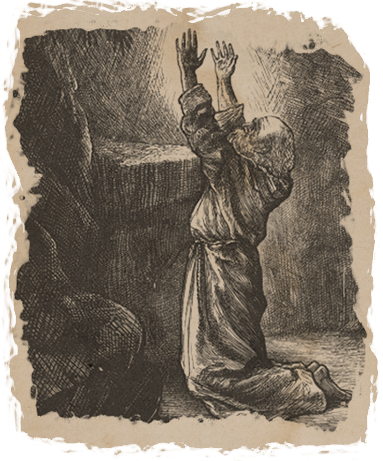
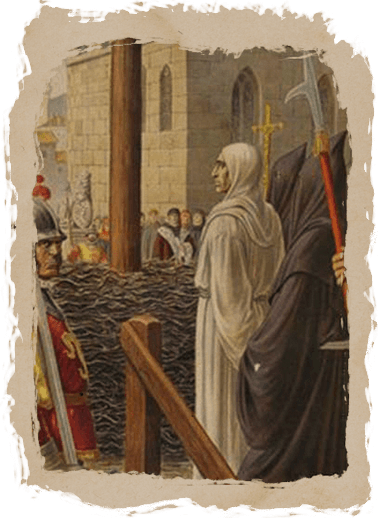
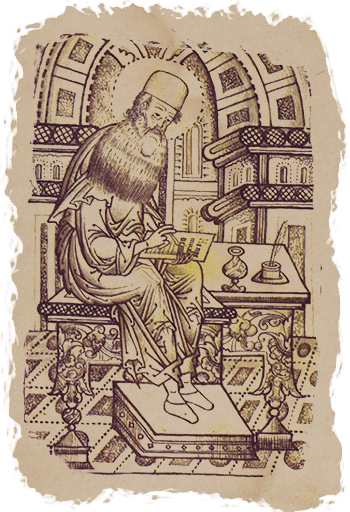
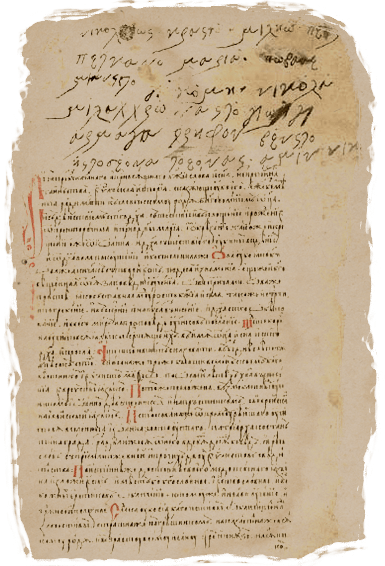
 From my beloved Holy Mountain, I found myself in Russia. It was not in my plan, I did not want it. But I loved my mission because I loved my obedience. And that obedience rewarded me. I found myself close to a people blessed with great sensitivity, religious zeal and hospitality of spirit. There came moments when this people made me very bitter. But just as was ready to despair, she revealed a face of great humility and love to me. I had heard a great deal about Russia. And when I arrived, I was ready to fight. I knew my mission. First translations. Then, ensure donations for Vatopedi. And finally, to do whatever I could to ignite a spark of hope for my troubled race.When I arrived in Moscow, I wasted no time. I organised the translation of the Psalter and I gradually began to classify the riches of the ruler’s deserted library. I may have been thousands of miles from my Monastery, but I wanted to keep it in my life. So, I gave no thought whatsoever to ceremonies and receptions and rejected every secular encounter. It did not take long for me to understand the incredible luxury and cheer of the Palace, where the senior clergy always held their position. I gradually came to understand that even the receptions in the Holy Monasteries were not lacing in luxury and incredible waste. The thought that the cost of such a reception could feed a Monastery on the Mount for a year saddened me.Each Russian Monastery was a small palace. The property they owned stretched further than my eye could see. Extensive lands and entire villages fed the brotherhoods with all sorts of wealth. Worst: I found that the Monasteries were systematically lending and charging interest.
From my beloved Holy Mountain, I found myself in Russia. It was not in my plan, I did not want it. But I loved my mission because I loved my obedience. And that obedience rewarded me. I found myself close to a people blessed with great sensitivity, religious zeal and hospitality of spirit. There came moments when this people made me very bitter. But just as was ready to despair, she revealed a face of great humility and love to me. I had heard a great deal about Russia. And when I arrived, I was ready to fight. I knew my mission. First translations. Then, ensure donations for Vatopedi. And finally, to do whatever I could to ignite a spark of hope for my troubled race.When I arrived in Moscow, I wasted no time. I organised the translation of the Psalter and I gradually began to classify the riches of the ruler’s deserted library. I may have been thousands of miles from my Monastery, but I wanted to keep it in my life. So, I gave no thought whatsoever to ceremonies and receptions and rejected every secular encounter. It did not take long for me to understand the incredible luxury and cheer of the Palace, where the senior clergy always held their position. I gradually came to understand that even the receptions in the Holy Monasteries were not lacing in luxury and incredible waste. The thought that the cost of such a reception could feed a Monastery on the Mount for a year saddened me.Each Russian Monastery was a small palace. The property they owned stretched further than my eye could see. Extensive lands and entire villages fed the brotherhoods with all sorts of wealth. Worst: I found that the Monasteries were systematically lending and charging interest.
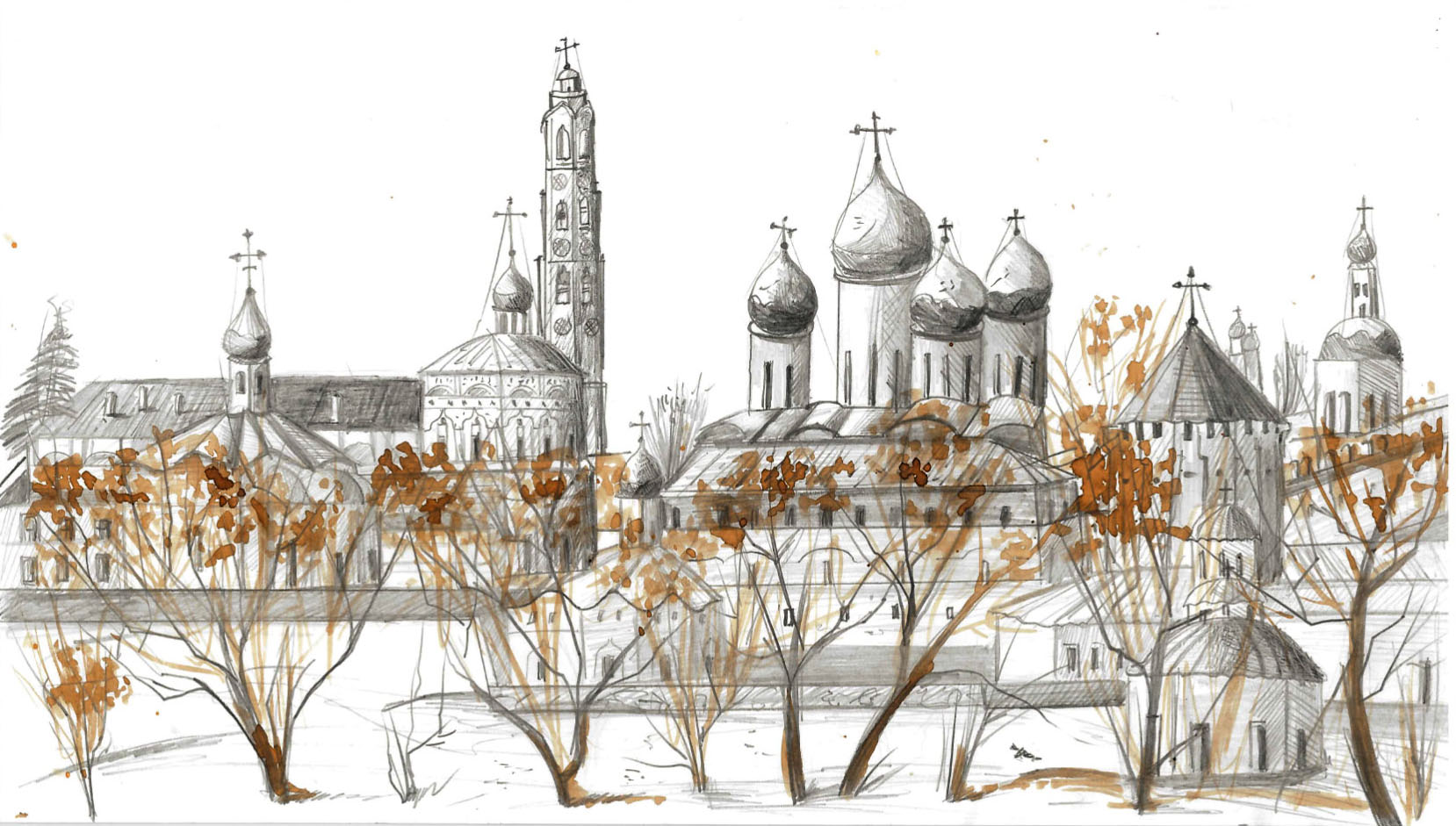 Painting
Painting


 Guilty!
Guilty!
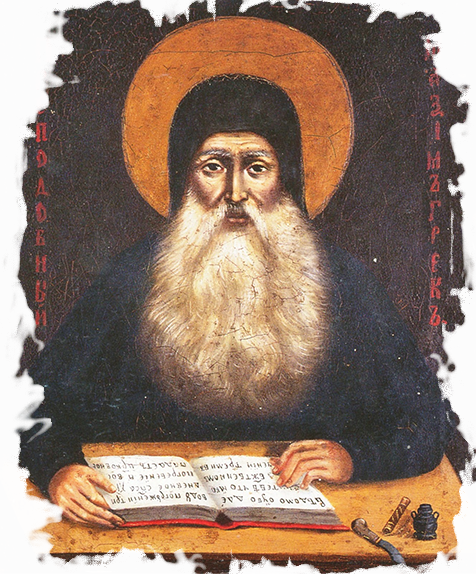
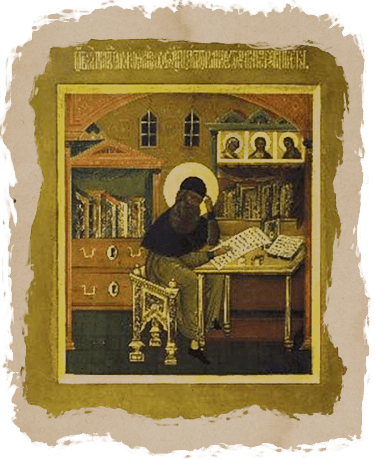
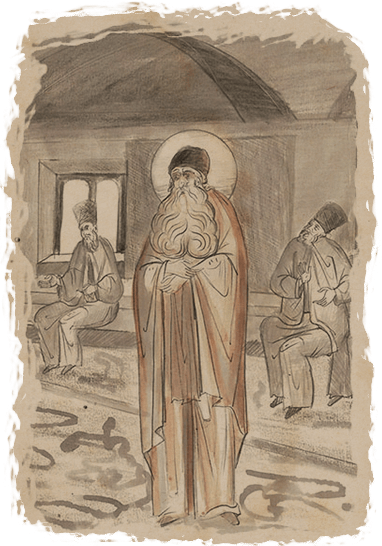
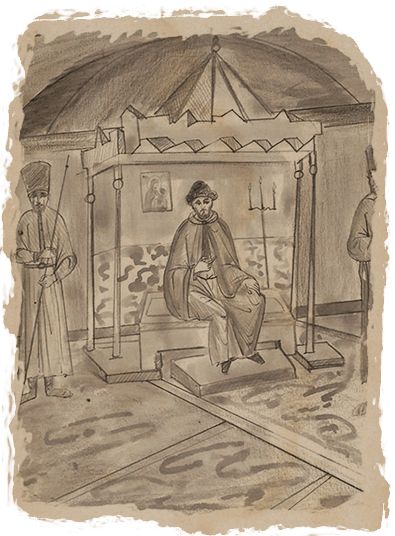
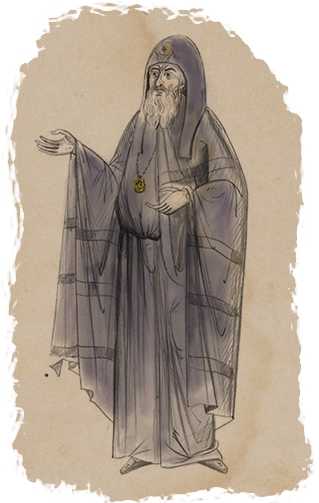

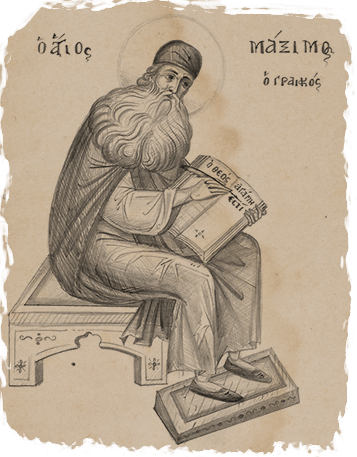
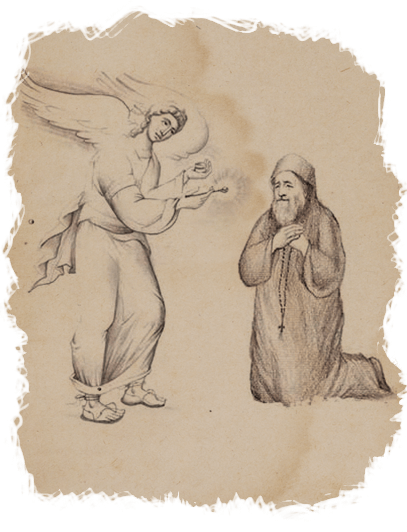

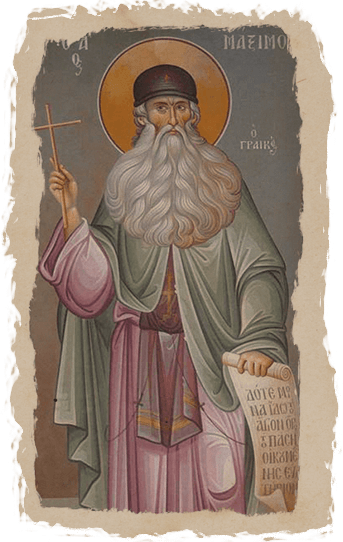


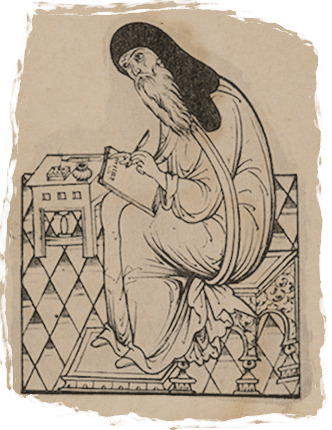

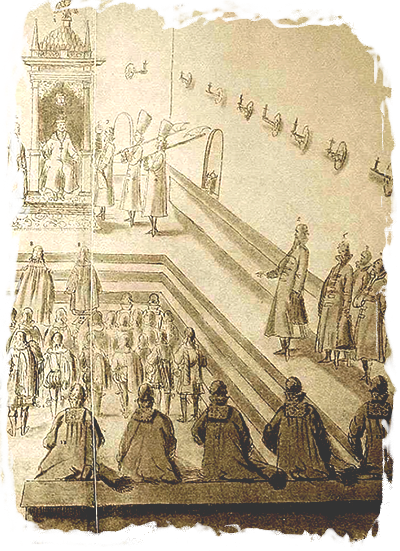

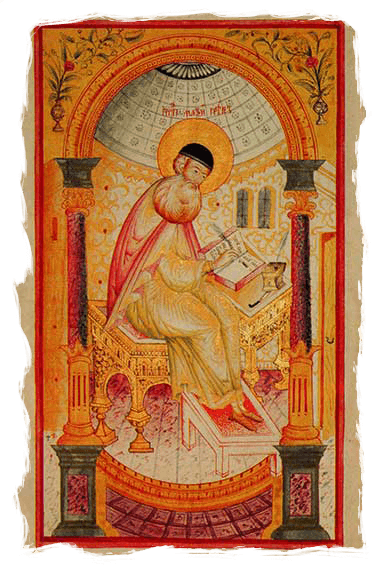

 You glorified ruler of all Russia,
You glorified ruler of all Russia,
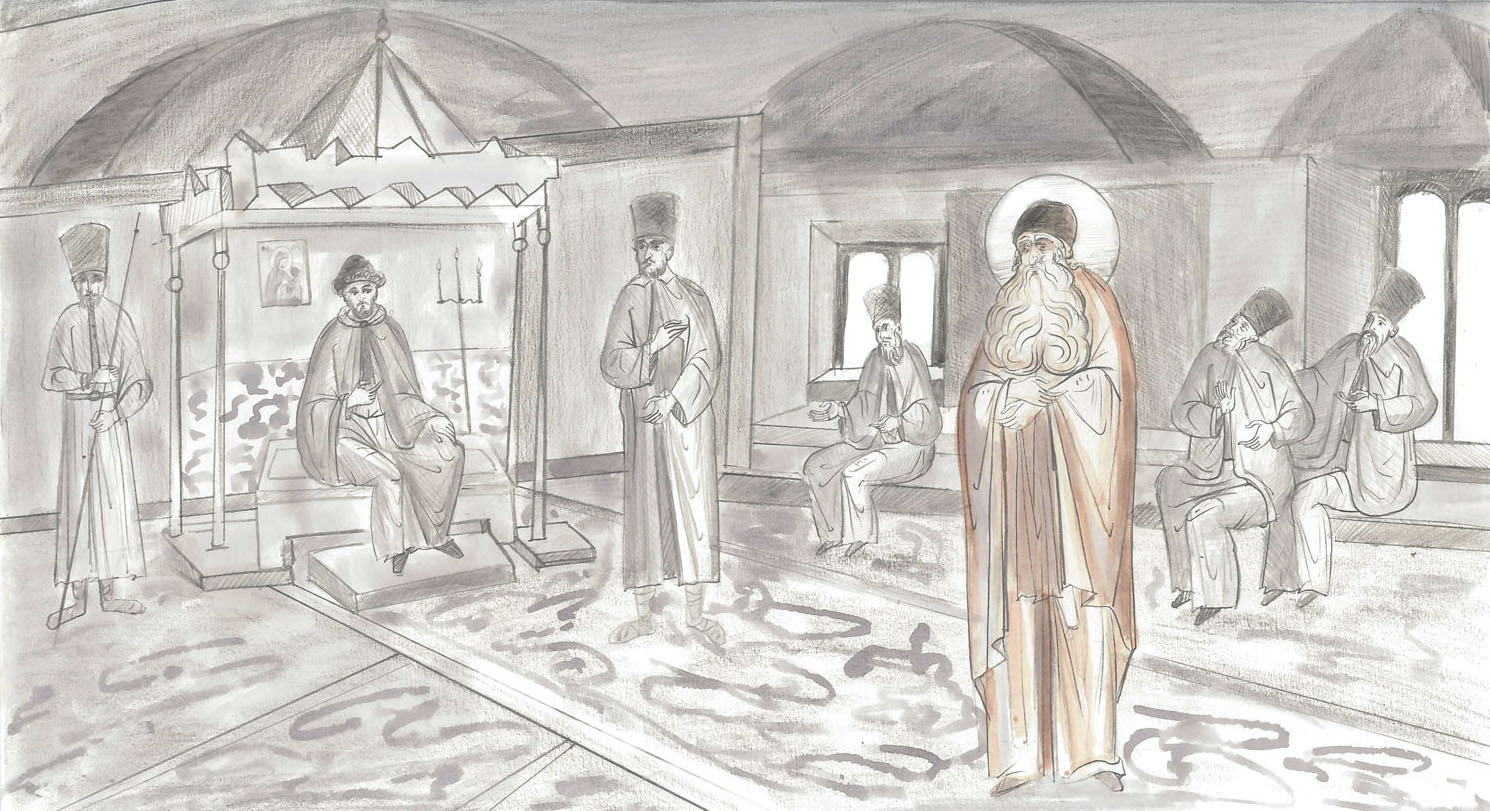 Αντιπροσωπευτικό σκίτσο
Αντιπροσωπευτικό σκίτσο


 A Saint's report
A Saint's report
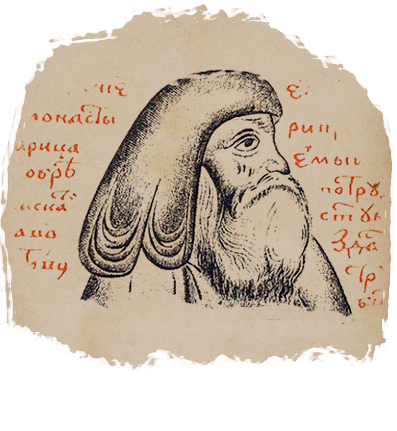
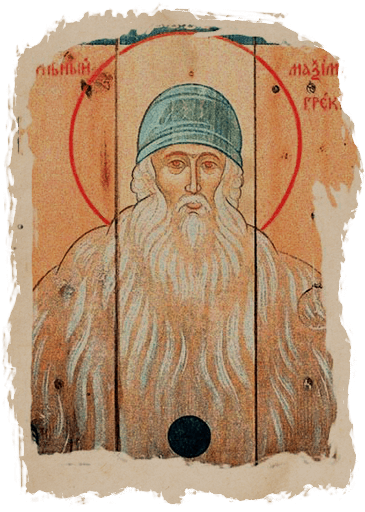



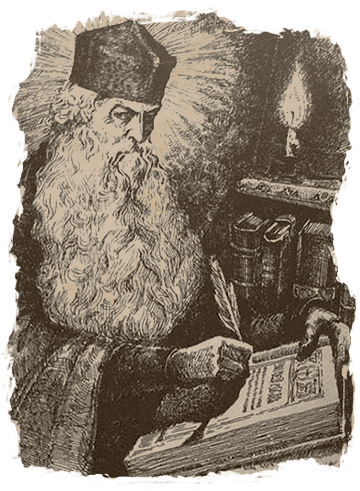


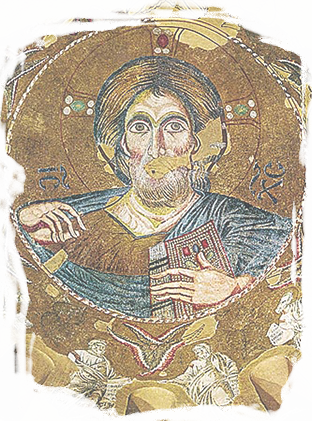





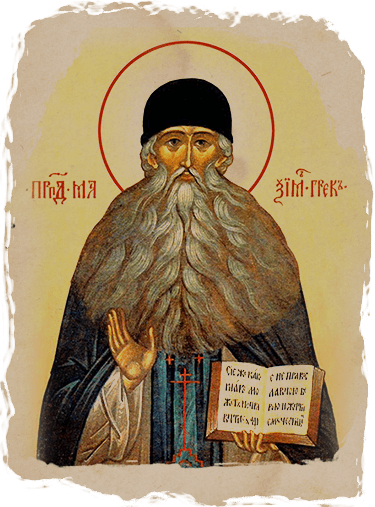
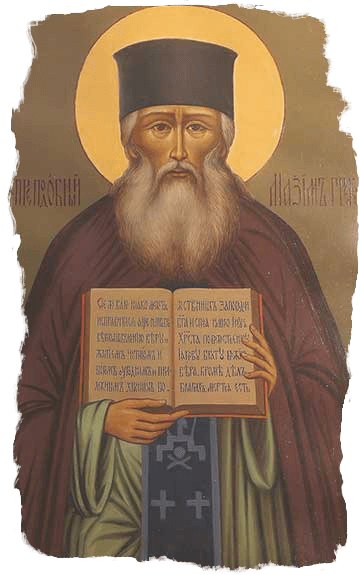
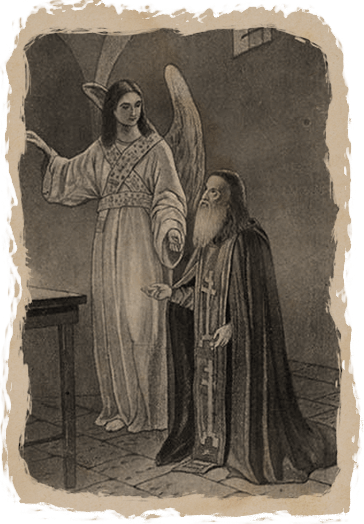
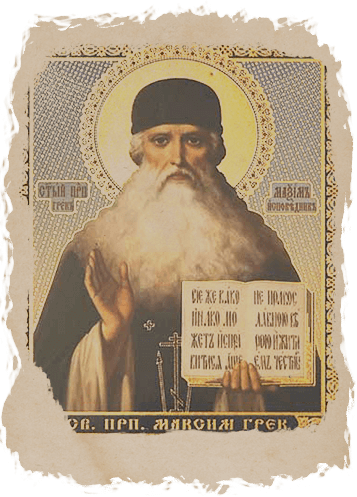



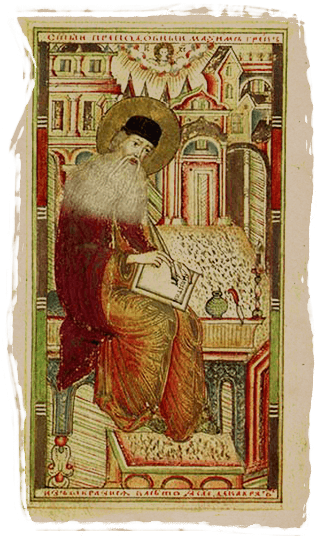
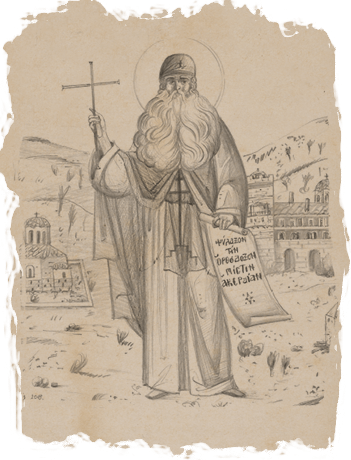

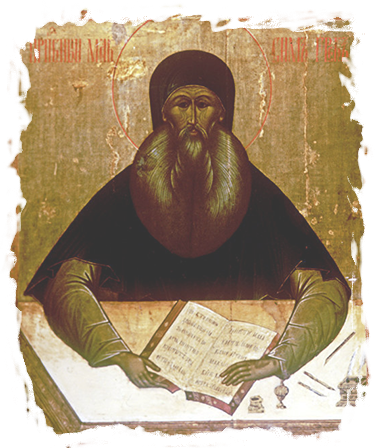 "After my first trial, I was often abused. There were moments when the beatings confused the pain. At times they poured boiling water on me and other times ice cold. They often filled my cell with smoke. But I did not care. My only concern was: To close my pen in my palm, not to let them take it. A pen from a swan’s feather. As long as I felt it hidden in my palm, I knew where I came from, who I was and where I was going.
"After my first trial, I was often abused. There were moments when the beatings confused the pain. At times they poured boiling water on me and other times ice cold. They often filled my cell with smoke. But I did not care. My only concern was: To close my pen in my palm, not to let them take it. A pen from a swan’s feather. As long as I felt it hidden in my palm, I knew where I came from, who I was and where I was going.

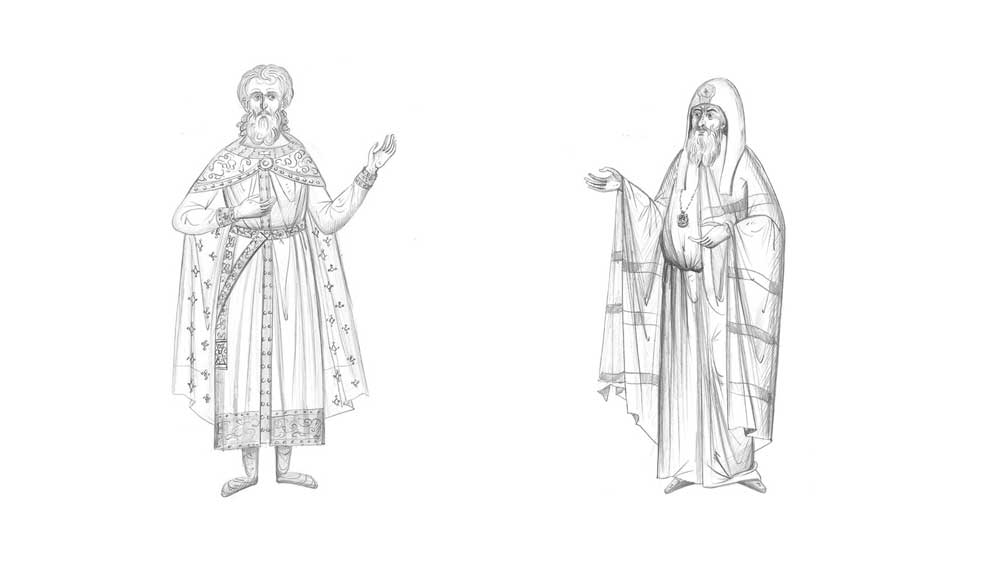 Painting
Painting








